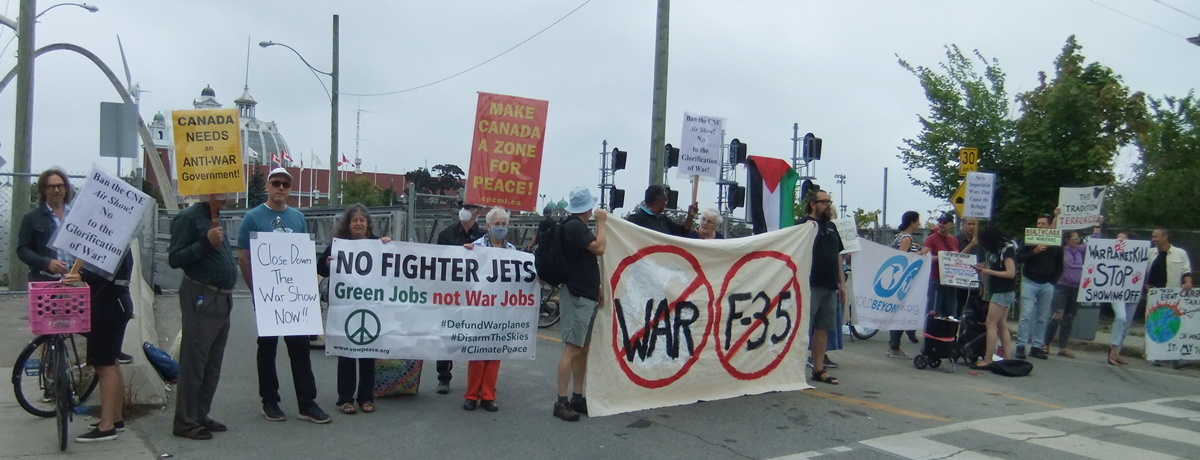No. 9
September 2022
On the Historical Juncture
• Introduction to Discussion on the International Situation
Make Canada a Zone for Peace!
• Say No to NATO Expansion into Canadian Arctic!
• Militant Action Against Promotion of War at Toronto Air Show
Britain
• New Prime Minister Takes Power
• Strikes Up and Down Britain Declare Enough Is Enough!
European Crisis
• Chickens of the 1989 Counterrevolution Come Home to Roost
• Mass
Demonstrations in Europe as Counterrevolution
Brings
Everything to a Head
United States
• Growing Opposition to President Biden's "America First" Offensive
• People Organize Rapid Response to Federal and State-Created Water Crisis
• Minimum-Wage Workers Cannot Afford Rent in Any State
• Tsunami of Shutoffs Expected for 20 Million Families Behind on Energy Bills
Colombia
• Investiture of New President, Vice-President
• New Government Takes Bold First Steps in Program for "Total Peace"
Japan
Assassination of Former Prime Minister Abe Shinzo
Anniversary of Vietnam's Independence
• Long Live the Socialist Republic of Vietnam!
• Canada-Vietnam Friendship Society Marks
Vietnam's
August 19 Revolution and National Day
India
• Farmers Across the Country Continue Protests and Agitation
On the Historical Juncture
Introduction
to Discussion on the
International Situation
This introduction to discussion on the international situation was delivered by Pauline Easton to a meeting of members and supporters of CPC (M-L) held in Gatineau, Quebec on July 27, 2022. It is based on the theoretical work of CPC (M-L) on the modern definitions required to make way for the renewal of the political process and the constitutional order.
Of utmost importance today is to recognize that we are living through a rare historical juncture where the Old has passed away and the New has yet to come into being. A main feature is that the productive powers of this world have developed beyond anything devised by humans in terms of politics. What does this mean and what are the consequences?
The
old international system came into being with WWI, the Versailles
Treaty, WWII, etc. The world order required two world wars to establish
it. International law, trade agreements, treaties, financial
institutions, the UN -- everything came into being. The period has
achievements of which the biggest is the proof that there is an
alternative to imperialism and imperialist war. The Great October
Socialist Revolution and the establishment of the USSR in 1922 gave
birth to the New in this regard.
Historically,
speaking within the context of the existence of class societies, wars
are the mechanism for changing systems. And world war is unleashed when
we have a world market. The October Revolution and establishment of
Soviet Russia and subsequently the USSR in 1922, provided an
alternative in the form of anti-war governments. Because of the
development of capital trying to wipe out socialism and communism as a
system, the world saw the rise of Nazism and the fascist state as well
as Japanese militarism. The USSR stood against this. Together with the
resistance waged by the workers and peoples of the world, it showed a
way out of imperialist war.
At the conclusion of WWII, referencing crimes against humanity, war crimes, crimes against the peace, the definitions came out of the Nuremberg International Tribunal (and similar tribunals). These instruments were given international recognition and they have significance in liberal historiography because it is claimed that the U.S. is responsible for them, when it was the Soviets who were able to provide the summation of the experience which gave rise to the definitions, especially in relation to defining aggression. Today, these are all things which are used against the peoples of the world, as in the example of U.S. claims against others of genocide, crimes against humanity, etc.
The liberal left has a tendency to refer to Nuremberg and various instruments like the Universal Declaration of Human Rights -- all the things that were part of the defeat of fascism -- to put the U.S. forward as the main force in establishing these concepts, saying that they are Anglo-American, not French, not Soviet. In fact, it was the Soviet jurists who were instrumental in defining aggression and crimes against the peace, amongst others, not the Americans.
The significance lies in how this was used to detract attention from the need to unite the peoples in action to establish conditions which would provide their desire for peace, freedom and democracy with a guarantee, such as by carrying out denazification, demilitarization and bringing those who had committed crimes to justice. To achieve this, a notion and practice of complicity was developed. This goes beyond the Anglo-American conception of a secret conspiracy. Conspiracy is necessarily a secret affair while complicity merely required establishing where aggression is coming from and what various forces are doing in relation to that. It is not akin to a secret conspiracy. It is not secret and there is no need for direct contact.
One
of the first examples of this was provided by those countries which
supported the U.S. imperialist claim that the Democratic People's
Republic of Korea (DPRK) aggressed against the Republic of Korea (ROK)
thereby proving itself an aggressor and justifying the 1950
intervention of 22 UN member nations in the war on the Korean Peninsula
under the UN flag. First the U.S. imperialists openly divided Korea at
the 38th parallel and created the ROK to undermine elections being held
nationwide by the Korean people and their leadership who had won their
liberation against the Japanese occupation. On this basis, they set up
a virulently anti-communist puppet regime in the ROK and instigated a
civil war. They engaged in countless provocations at the 38th parallel
and when the DPRK defended against these attacks they blamed it for
"invading the south" and committing aggression. The U.S. openly muddied
the definition of aggression and made other countries complicit with
them in the name of checking the spread of communist aggression.
The overall contribution coming out of Nuremberg was the definition of aggression, which included preparation and propaganda for war. Even before Nuremberg established the definition, atomic bombs were used. Within the first few years of the development of nuclear weapons in the 1940s, there developed a relationship of nuclear weapons to the U.S. state, through the Office of the President. Once the connection of nuclear weapons with the Office of the U.S. President was established permanently, there is no way that the U.S. would not be a force against the definitions established in Nuremberg. Backed by the entire university and industrial forces, it became a force of aggression.
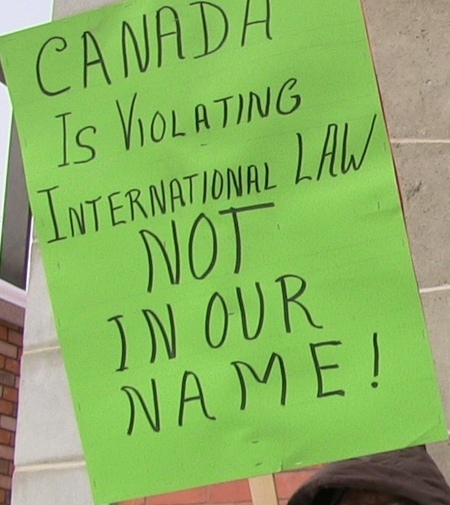 This arrangement
is at the heart of a permanent war establishment in the U.S., of what
is called the civilian-military-industrial complex. All the arguments
used are incidental to the fact that nuclear weapons are actively used
to define aggression. They are the ultimate weapon. This is not simply
because it is a weapon of mass destruction. In fact, the firebombing of
Tokyo led to more deaths than did the dropping of nuclear weapons on
Hiroshima and Nagasaki. The reason is that the nuclear bomb was
initially seen as a bigger bomb. Later, anything said to threaten U.S.
security was designated a weapon of mass destruction. This is the
definition today used to criminalize anyone even if their crime is to
use their speech in a manner the rulers declare threatens national
security, as in the case of Julian Assange. The U.S., Britain,
Australia, Canada and other U.S. toadies are complicit in getting him
extradited to the U.S. despite his not being a U.S. citizen and not
having committed any crime. On the contrary, he exercised his civil
right to speak and propagate information.
This arrangement
is at the heart of a permanent war establishment in the U.S., of what
is called the civilian-military-industrial complex. All the arguments
used are incidental to the fact that nuclear weapons are actively used
to define aggression. They are the ultimate weapon. This is not simply
because it is a weapon of mass destruction. In fact, the firebombing of
Tokyo led to more deaths than did the dropping of nuclear weapons on
Hiroshima and Nagasaki. The reason is that the nuclear bomb was
initially seen as a bigger bomb. Later, anything said to threaten U.S.
security was designated a weapon of mass destruction. This is the
definition today used to criminalize anyone even if their crime is to
use their speech in a manner the rulers declare threatens national
security, as in the case of Julian Assange. The U.S., Britain,
Australia, Canada and other U.S. toadies are complicit in getting him
extradited to the U.S. despite his not being a U.S. citizen and not
having committed any crime. On the contrary, he exercised his civil
right to speak and propagate information.
As for nuclear weapons, they were used repeatedly to threaten the Soviet people, the Soviet system, Korea, Vietnam, Cuba and the peoples of Europe as a whole. What is not so readily understood is that the issue is more about the Office of the U.S. President. The oath of Office of the U.S. President is not, as is widely believed, to defend the Constitution of the United States. It is to faithfully execute the Office. The second aspect of the Oath merely says the President must protect the U.S. Constitution "to the best of their ability." This can mean anything each president defines it to be according to the private interests in control of the Office. The Oath always has both aspects: one is for the whole government machinery of police powers and the other is to provide this with a constitutional legitimacy.
Prior to the creation of the Federal Bureau of Investigation (FBI) as a federal police force in 1908, police powers were initially mainly state-based -- a matter which pertained to local courts and police forces. Local court rulings at the state level had control of the establishment and conduct of police powers. Today in the United States there are 17 intelligence agencies including the FBI, all part of the federal executive's police powers. They are a separate authority to that of the states, linked to the control of nuclear weapons and the permanent military establishment and bureaucracy at the federal level. They are used to define and limit all the struggles which take place whether within the U.S. or abroad. All of this and the nuclear weapons themselves are used outside of the UN mechanism.
Complicity
is more than a conspiracy. It is common today at a time governments of
police powers have taken over and politics have broken down. For
instance, the different wings of the cartel that created the
presidential debates in the U.S. at the time of the Clinton presidency
kept upping the ante with the aim of winning over and connecting those
responsible for the machinery of state to the money market. Today the
speculation of what are called super PACs in elections has reached
unprecedented levels. Super PACs can raise unlimited sums of money from
corporations, unions, associations and individuals and spend unlimited
amounts to support or oppose candidates. As of August 15,
2,325 groups organized as super PACs reported total receipts
of $1,488,195,425 and total independent expenditures of $430,215,694 in
the 2021-2022 election cycle.
All of this
concerns the point reached today in which elections no longer operate
to sort out the contention within the ruling factions over control of
the political power. What used to be political parties within a polity
said to serve a public good and defend a political authority have
become mafia-style cartels which are instruments of narrow private
interests who now directly wield the political powers to favour their
own interests. This feeds civil war scenarios domestically while
internationally, once politics breaks down, we are beyond the issue of
what constitutes aggression as defined at Nuremberg. We are
also no longer dealing with war as politics by other means because
there are no politics, just dictates to impose submission and, failing
that, destruction of the productive powers. This has been
developing over a long period seen in the U.S. dictate to not
permit negotitions to achieve peace, as in Palestine, Syria, the DPRK,
Ukraine and other conflicts. Since the creation of Israel, the division
of Korea and the Korean war, the division of India and many other
examples, complicity has given rise to permanent situations of no
war/no peace and, today, wars of destruction of whole nations and their
productive powers. At the heart of the complicity is the suggestion
that the entire affair has constitutional legitimacy in the United
States.
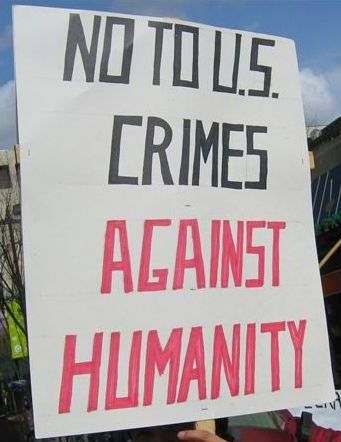 In the case of
Libya, the U.S. destroyed a whole society; it no longer exists. But at
the time of the U.S.-led NATO war, Obama said it was not war or even
hostilities. In other words, the case of Libya shows how the problem of
police power exists internationally. But more than this, in the case of
Libya, when Obama said the invasion did not rise to the level of war,
he was declaring a new doctrine which became known as the
Obama doctrine. The Obama doctrine basically said that engaging in a
war does not require a constitutional mechanism. Obama went so far as
to say that the destruction of Libya did not even constitute hostility
as defined by the laws of war. This also further broke the bounds of
the U.S. Constitution. This doctrine included the declared right to
carry out assassinations through drone warfare, use private contractors
to engage in warfare under false flags of humanitarian missions, etc.
In the case of
Libya, the U.S. destroyed a whole society; it no longer exists. But at
the time of the U.S.-led NATO war, Obama said it was not war or even
hostilities. In other words, the case of Libya shows how the problem of
police power exists internationally. But more than this, in the case of
Libya, when Obama said the invasion did not rise to the level of war,
he was declaring a new doctrine which became known as the
Obama doctrine. The Obama doctrine basically said that engaging in a
war does not require a constitutional mechanism. Obama went so far as
to say that the destruction of Libya did not even constitute hostility
as defined by the laws of war. This also further broke the bounds of
the U.S. Constitution. This doctrine included the declared right to
carry out assassinations through drone warfare, use private contractors
to engage in warfare under false flags of humanitarian missions, etc.
It confirms that it is not only the likes of Trump who outrightly calls for the U.S. Constitution to be trashed but that the wing of the U.S. ruling class which claims to uphold the liberal democratic institutions and safeguard constitutional order is just as keen to trash it. So too the current government of Canada is striving to concentrate police powers in the executive and make the legislatures useless, all in the name of preserving the constitutional order. The rulers in various countries which are complicit with the claim that they follow a so-called rules based international order, are concentrating more and more police powers in their executives which have been taken over by narrow private interests. They are engaged in the battle over control of all the productive powers which have developed beyond anything devised by humans in terms of politics. What they cannot force into submission, they destroy.
Rulers are dealing with contradictions that cannot be resolved internationally from the perspective of the interests of huge oligopolies which have been brought into being. The entire world is hostage to the U.S. dilemma of how to maintain the order that was brought into being following World War II that allows the U.S. to claim itself a superpower. Those countries which are upholding the UN Charter and the international rule of law established on its basis after WWII are trying to erect a block against what the U.S. is doing which comes up against the problem of complicity established by the U.S.
Since the presidency of Ronald Reagan, the new modus operandi became one of seeking the complicity of what are called allies. It was under Reagan, and in Britain under Margaret Thatcher, that the basis for the neo-liberal anti-social offensive was laid in the name of neo-conservatism. It was a program to restructure the state arrangements nationally to make the people pay for the crisis of the social welfare state and escalate the use of covert methods internationally. Since the collapse of the former Soviet Union under the pressure of the reactionary restructuring called perestroika and glasnost, we have seen the Anglo-American rulers and their accomplices destroy the productive powers of the most ancient peoples, including Iraq, Libya, Syria, among others. Many things have come to a head. This includes the end of the Cold War and the end of the world order of the big imperialist powers. These are two moments which are related and have their own motion. The imperialist countries that had two world wars that served to wipe out England and France as major powers are all still around, as is the contention and collusion between the U.S. and, today, not the Soviet Union but Russia, on what has always been called the German Question.[1]
A problem the rulers face is that in the U.S. there is still an entire constitutional system in place. It is the basis for U.S. society to take the form of a republic – from 13 colonies to states to their expansion to the entire territory designated as the United States today. The period of establishing nation-states which took place coming out of the English Civil War in the 1660s, was also a period of international crisis which brought with it the beginnings of the creation of the United States, accompanied by various wars. The conception of sovereignty, whole and undivided, developed both in France and England, initially in the name of divine right as seen in the establishment of the Church of England and the takeover of church lands under Henry VIII and then Elizabeth I in England and the declaration by Louis XIV, l'État c'est moi! in France. The basis of the ultimate decision came out of the regicide of Charles I in the theory put forward by Thomas Hobbes in his famous book Leviathan which expounds his Covenant Thesis -- the theory of a fictional person of state and a public authority and constitutional order emanating from that. It deals with two interlinked issues which arose out of the civil war and provides the basis for the law of nations also referred to as the law of war.
In accord with this, autonomous nation-states can have peaceful relations with others or go to war. War is central in all the matters which pertain to relations between countries recognized as nation-states established on the European model no matter whether the form of government be monarchic or republican. The wars which were taking place during a 60-year formative period in China, Persia, the Americas and Europe were on par with what later took place known as world wars. That formative period was another rare conjuncture which also involved environmental crisis. Nation-states and the theory of nation-states and their link to military capability and, more importantly, the development of the productive powers, became a new whole. An essential part of the inquiry into those formative years also requires examining the influence of proletarian revolution, especially from 1848 at the time the Communist Manifesto by Marx and Engels was published with its summation of the entire period, to today.
As for the theory of representation, how people relate to the state, the problem is not just that the state is machinery for coercion but that it involves membership in the polity. The definition of membership provided by Hobbes is basically what we have today. It is going through death throes but it will not be finished until modern definitions are given rise to on the basis of mass democratic mobilization and methods.
The main obstacle to the renewal required today is that the state deprives people of an outlook. This has been the case since the 1600s and is a matter that must be addressed.
A conjuncture is a turning point, a point at which everything comes to a head. If history is not paid attention to, we will not recognize that it is a particular, rare type of conjuncture. For instance, in the 1970s, we said that revolution was the main trend. Either revolution would impede imperialist war or imperialist war would give rise to revolution. Everything would be settled. But this is not what happened. With the collapse of the former Soviet Union, the flow of revolution turned into an ebb. Revolution went into retreat. The initiative went out of the hands of the working class and people and into the hands of the reactionary bourgeoisie and its anti-social offensive which prioritized the restructuring of the state to favour narrow private interests. Counter-revolution set in.
Engels hinted at this after the death of Marx, at a time when the German social-democrats were getting elected to governments. He spoke to elections pointing out that the attainment of universal suffrage was a measure of the maturity of the working class. He said movements will have to be crushed within the first two decades of the 1900s, that there would be a world war to crush these movements. His argument did not concern itself with when war would occur but rather that only the proletariat could build a new society.
It is not uncommon to see people take arguments from the past and misuse them in the present to speculate about what will occur. From all the various historical periods, important conceptions and movements are used as reference points. That is ok. The arguments per se may not be wrong, but they miss the point. They are End of History type of arguments. End of History arguments claim that ideology evolves -- the ideology of capitalism or socialism, or any other, evolves like a species evolves, with a beginning, a middle and an end. There is no proof of this since ideas and ideologies have a material basis. They are not a matter of spinning ideas out of ideas. The way the author of the End of History thesis Francis Fukuyama put it, was to say that what was evolving was the form of government. He was not talking about beliefs, which is to say what is in the heads of people, which is often confused with ideology. Fukuyama said ideological form had reached its final form.
Forms have to do with what happens between individuals and the collective, how representation takes place, how governing takes shape. These are forms, not content. When people talk about crimes against humanity and beliefs, ideological form addresses how things are sorted out and how the brain cognizes these relationships. Discussion of views is important but what is coming to a head is the form of representation. This form based on Covenant Thesis allows that a collective, a polity, can have powers over individuals. This is the context in which Fukuyama posits the end form of that government.
End of History says there is no other way except through that form of government to sort these issues out. That is false. Individuals and collectives and the general structure of society and international institutions and organizations all exist. What the Anglo-American rulers and their accomplices are asking for is complicity with this final form and it is the recognition of this that the disinformation of the state blocks. All movements for justice, peace and democracy are to focus on reshuffling the constitutional order, not to having fidelity to the relations between humans and humans and humans and nature and what they reveal, which is the need for the people to empower themselves by making the claims which they must. They must speak in their own name, not hand over their authority to others who represent a fictional person of state who rules above them.
How to develop one's own defence organizations? What is their basis of authority? Answering such questions is important because private interests say they themselves constitute the public authority because it is constitutional. This does not deal with the content of a public authority. The way society is constituted is form.
The productive powers are huge at this time and they are created by human beings who are classed as subservient to those productive powers. But it is their work, the work of human beings. The working class is part and parcel of those productive powers but forced into a subservient relation because the ruling class claims ownership. The productive powers created by humans along with the rapid development of science and technology, are the source of the relations. There is no society outside of them. These powers have exceeded the limits of any forms. The weapon of choice to destroy the productive power is nuclear weapons.
Going back 10,000 years or so, human beings have been developing their own means of subsistence, agriculture, domestication of animals, the beginnings of cities, technology and so on. This gives rise to the creation of human need and this is what drives everything else. The revolution which took place in that historical conjuncture was more gigantic than more recent revolutions. That was the conjuncture we all come out of.
In the U.S. election which culminated with Trump being brought to power, Trump said Clinton was against global warming and he was against using nuclear weapons. These are two parts of the human productive powers which have grown so powerful, they are beyond the control of the productive forces. According to geologists we are living in a period of Anthropocene, where humans exist as a geological force of nature. Climate exists as a human force. There is recognition that the human productive forces have created this situation. Models for global warming came from the development of nuclear weapons and predictions of nuclear winter. Suffice it to say that a long history of human development is coming to a head. We could have another ice age, or the like.
A problem for rulers is that they think they can predict who will represent them but even with 17 intelligence agencies, they no longer can. Hilary Clinton found this out when she lost the election to Trump. In that election, Clinton said the purpose of an election is for millions of people to stake out a side. So too today with the factional contention going on in the United States, that end form of representational state and its political process can no longer make predictions about how things will turn out. People are simply asked to stake out a side. All of it underscores that all the forms which provided equilibrium, and a certain stability and predictability on that basis, no longer function. Nothing that is in place can make predictions and this is one of the reasons governments of police powers kick in -- to preserve the state.
Rulers need to make predictions. For instance, how to deal with developments in China, where hundreds of millions of people -- the size of the population of the U.S., Canada and Mexico combined -- are moving from the countryside to cities and being proletarianized. The inability of the U.S. imperalists and their accomplices, including Canada, to analyze by taking into account the specificities of the historical juncture and the ramifications of the technical and scientific revolution, leads the U.S., Britain and others to become ever more desperate in their striving to control the productive powers which have escaped their grasp. What they cannot control they then seek to destroy, creating the extremely dangerous and volatile situation we experience today.
The historical
juncture engenders different possibilities. One is that societies can
collapse. There is also the recognition of societies established beyond
the narrow horizon of bourgeois right or civil society. It is possible
to have "from each according to ability to each according to need."
We need a way to calculate human need and meet it. There is no political process for this at this time. The rulers talk about preferences, not about interests, which is why the political process and institutions do not allow for predictions and terrorists are doing things the rulers cannot predict. They are outside of their civilization. The Bush argument that you are either with us or with the terrorists is about those trying to make calculations about the whole world order. They cannot make predictions because they are not in tune with the motion of society at this rare historical juncture that has to be dealt with. The mechanism of the U.S. and NATO powers to deal with this situation is war -- civil war at home and world war.
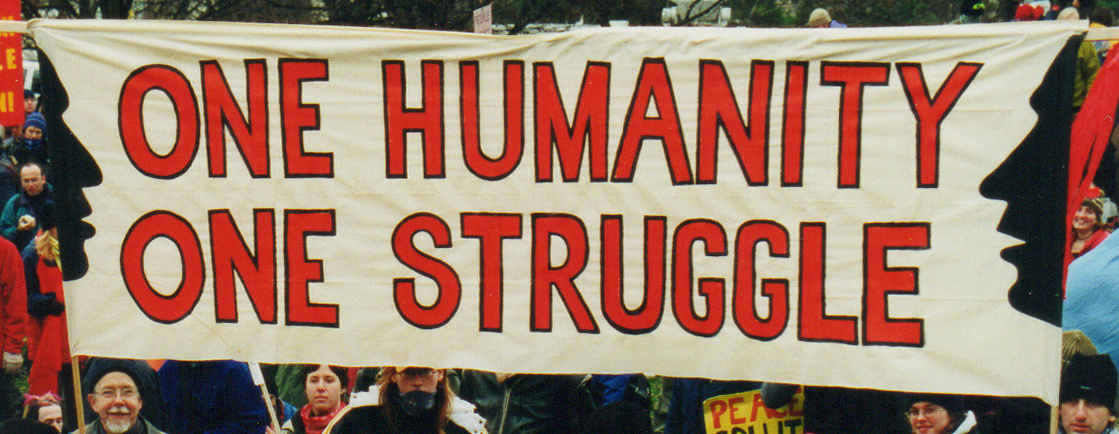
1. Wikipedia on the German Question.
Make Canada a Zone for Peace!
Say No to NATO Expansion into Canadian Arctic!
NATO Secretary General Jens Stoltenberg made a visit to Canada August 24-25 where he toured military installations in Edmonton, Cambridge Bay, Nunavut, and Cold Lake, Alberta. This visit was all about opening a path to militarizing Canada's High North by the U.S. and its aggressive NATO alliance. It underscores not only the aggressive aims of the U.S. against Russia and China, but against Canadian sovereignty in the Arctic as well.
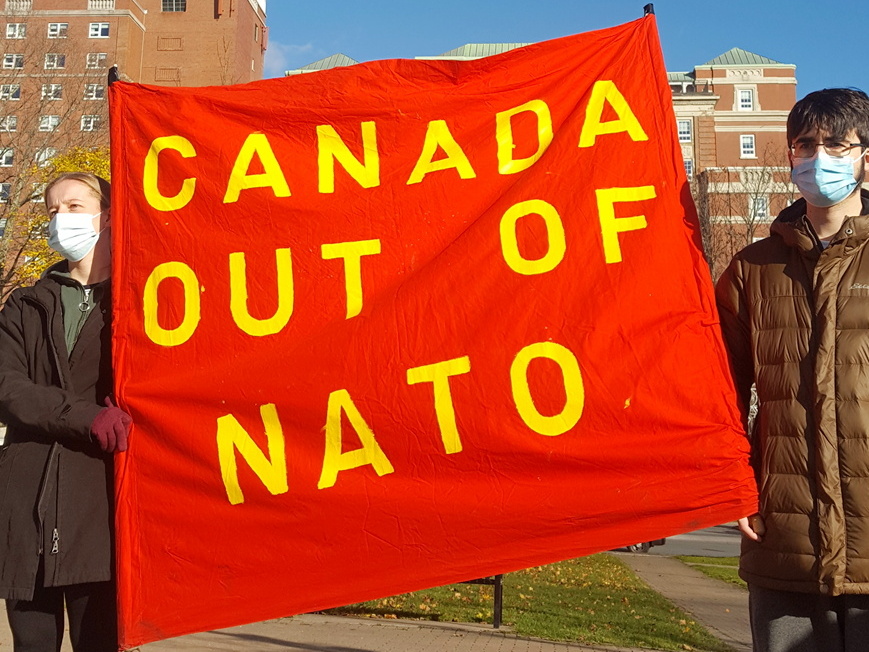 Prime Minister Trudeau
accompanied the NATO Secretary General on this trip. Trudeau tried to
deflect attention from what is being cooked up saying there has been
"no deep shift" in Canadian policy when it comes to NATO involvement in
the Arctic. In the next breath, he confirmed what he and his government
are actually planning. The "Russian aggression" has made it "timely" to
"share with NATO" its efforts to protect the Arctic region, Trudeau
said.
Prime Minister Trudeau
accompanied the NATO Secretary General on this trip. Trudeau tried to
deflect attention from what is being cooked up saying there has been
"no deep shift" in Canadian policy when it comes to NATO involvement in
the Arctic. In the next breath, he confirmed what he and his government
are actually planning. The "Russian aggression" has made it "timely" to
"share with NATO" its efforts to protect the Arctic region, Trudeau
said.
It is not everywhere Stoltenberg goes that he gets an op-ed piece in the country's leading monopoly news media. In this case, on August 24, the Globe and Mail published his op-ed to set the tone for the visit. The content was routine NATO warmongering which labels anything other than the interests of the U.S., first and foremost with its imperialist bloc in tow, as a threat to be met with brute force.
Stoltenberg used the opportunity to assert that while the
Arctic "has traditionally been an area of low tensions," that time is
fast coming to an end. He targeted "Russia's ability to disrupt Allied
reinforcements across the North Atlantic" as "a strategic challenge to
the Alliance." He also singled out China's plans for a "Polar Silk
Road" -- a trade route linking China to Europe via the Arctic -- as a
threat "that challenges our values and interests."
Canada has long been worried such activities and presence would undermine its claim of sovereignty in the Far North, for example its claim to the Northwest Passage which is not recognized by the U.S. and several other NATO members that follow the U.S. lead. During a press conference in answer to a question, Trudeau explicitly said that the Northwest Passage is Canadian territory. But his words are not matched by Canada's deeds when it makes arrangements to share responsibility to "protect the Arctic" with NATO and NORAD. This clearly is a shift.
|
Trudeau was reluctant to come right out and commit to major NATO-led exercises on Canadian soil in the High North. However, Defence Minister Anita Anand said allied participation in domestic Canadian military exercises would be welcomed.
The Canadian Press on August 24 reported that Canadian "experts" agree that "Stoltenberg's visit appears to represent an easing of Ottawa's past reluctance to work with NATO in the Arctic, even if Canada isn't opening the door completely."
The CBC for its part gave prominence to Yves Brodeur, a former Canadian ambassador to NATO, who is openly calling for NATO military forces to train in the Canadian Arctic. "That would be a good thing," Brodeur told Radio-Canada in an interview. "To have NATO troops from NATO nations together with Canada exercising in the High North would be, as far as I'm concerned, a big asset for the organization, for NATO."
The entire visit from start to finish was a NATO PSYOP assault on Canadian sensibilities to pave the way for militarizing the North, for NATO military exercises, and possibly even for stationing NATO forces in Canada's Far North.
This has dire consequences for the Indigenous peoples of the North and for Canadians, as well as the peoples and fragile environment in the polar region and the ability of nations to exercise their sovereignty. It warrants firm opposition by the peace-loving peoples of this country.
Uphold the
Right of Arctic Peoples to Establish Fraternal Relations Favourable to
Themselves
and World
Peace!
The tour of a NORAD early warning site in Cambridge Bay, Nunavut and Canadian Forces Base Cold Lake in Alberta by NATO Secretary General Jens Stoltenberg along with Prime Minister Justin Trudeau, August 25-26, is a matter of serious concern for Canadians. The tour was used as an opportunity to promote $42 billion of public funds the federal government is spending to strengthen U.S. control over Canadian territory and further integrate the Canadian armed forces into those of the U.S. in the name of strengthening NORAD and even European security.[1]
NORAD,
which stands for North American Aerospace Defense Command, is always
headed by a U.S. general and comes under U.S. Northern Command. This
means the U.S. Commander-in-Chief, the president of the United States,
decides what becomes of Canadian territory and armed forces.
To hide this arrangement, Prime Minister Trudeau repeated the disinformation that NORAD is about the "joint" defence of North America, and under "bi-national command." The argument given by Stoltenberg and Trudeau for investments in NORAD and a greater NATO presence in the Arctic was that investments to militarize the Arctic through NORAD will benefit the military alliance and its "1 billion citizens."
Stoltenberg's visit was used to whip up hysteria that Russia and China are threats to Canada and, therefore, Canada should further entrench NATO and NORAD in the Arctic. With the likely accession of Sweden and Finland to NATO, seven of the eight Arctic nations will be NATO members, Russia excluded, and thus NATO, by extension, should be able to further militarize the Arctic in the name of protecting its "1 billion citizens."
Ironically, claims by Stoltenberg that the shortest path for a Russian rocket to the U.S. is over the Arctic, present Canada as a threat to the security of the U.S. He also said China's plans for a "Polar Silk Road," a trade route linking it to Europe via the Arctic, as well as its plans to build the world's biggest icebreaker and its investments in energy infrastructure in the Arctic are a threat "that challenges our values and interests."[2]
In other words, even China's international trade that involves travel through Arctic waters is a threat which must be countered with militarization. This begs the question as to whether China's mere existence is now to be considered a threat to NATO and its members. How many of the 1 billion citizens NATO claims to represent could accept this irrational argument, not to mention the almost 1.5 billion citizens of China? The fact is that the Canadian people and the Indigenous peoples of the north have always opposed NATO and the U.S. striving to expand their presence and control over the Arctic.
For his part, Trudeau joined the hysteria, repeatedly referring to the Arctic, not as a land occupied by the Inuit since time immemorial, but as the "northern and western approaches to Europe." In other words, Arctic militarization is linked with European militarization.
NATO's presence was also justified in the name of responding to climate change, which it calls a "threat multiplier" and considers it first and foremost a security and military threat, rather than a threat to the peoples of the world and their well-being. The visit was used to suggest NATO's expansion into the Arctic is related to science and even protecting the environment, with the promotion of the new "Climate Change and Security Centre of Excellence" Canada hosts in the Canadian Arctic. All told, every irrational and spurious reason was floated to try and justify something which cannot be justified: militarizing the already fragile Arctic in the name of peace and security.
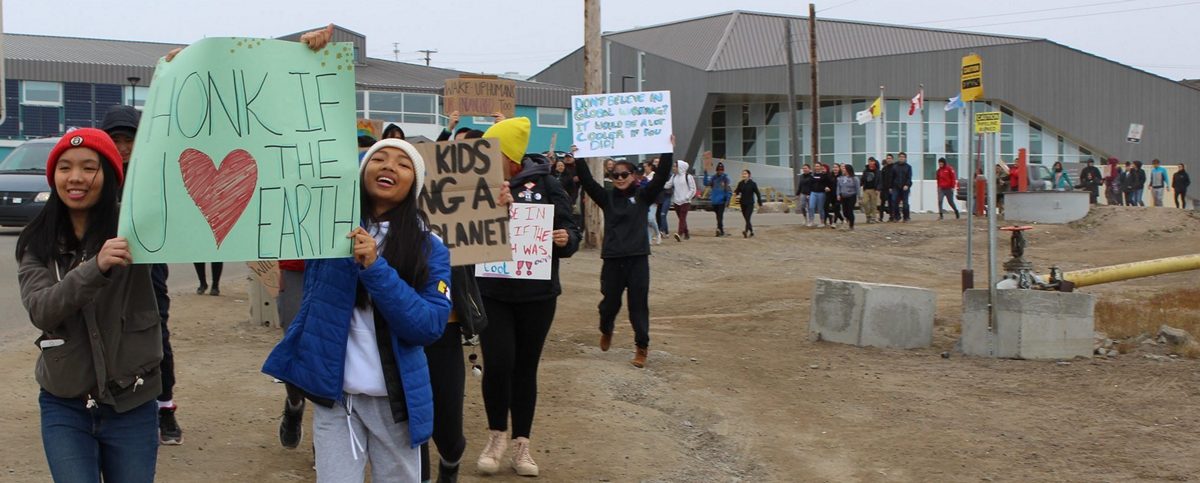 Youth in Iqaluit, Nunavut defend
their future and their right to a say in what takes place on their
territories in a climate march, June 5, 2019.
Youth in Iqaluit, Nunavut defend
their future and their right to a say in what takes place on their
territories in a climate march, June 5, 2019.
The fact is that the Arctic belongs to the Inuit and other Indigenous peoples who live on the Arctic territory of several nation-states, whose right it is to decide what happens there. This and their opposition to the militarization of the Arctic under U.S. command for the "benefits" it will allegedly bring them is always kept hidden. Trudeau revealed a guilty conscience when he stated: "We can never forget that sovereignty doesn't come through soldiers or scientists, it comes through the people who have lived here for millennia. Everything we do here has to not just be in support of them but drawing support from them for everything we do."
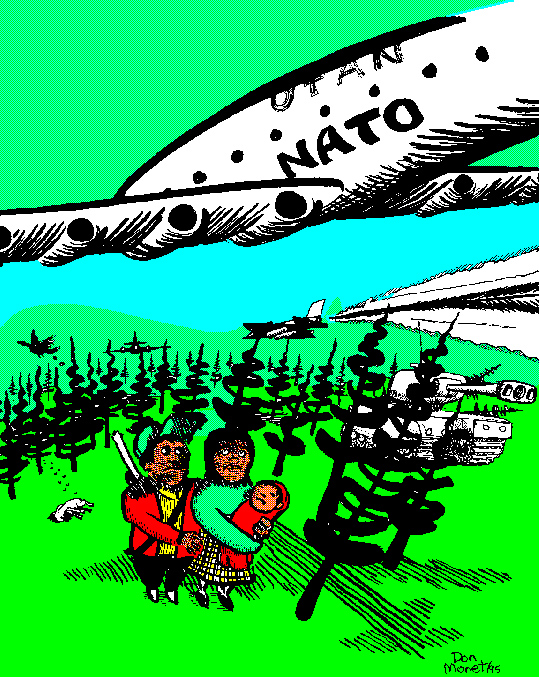 Who is he trying
to fool? Perhaps he thinks his appointment of an Inuit woman and former
president of the Arctic Circumpolar Conference as Governor General and,
in that capacity, the nominal Commander-in-Chief of the Canadian Armed
Forces (a position which really falls to the President of the United
States as a consequence of Canada's membership in NORAD and NATO) will
convince the Inuit that their concerns of yesterday have been taken
care of and no longer apply today?
Who is he trying
to fool? Perhaps he thinks his appointment of an Inuit woman and former
president of the Arctic Circumpolar Conference as Governor General and,
in that capacity, the nominal Commander-in-Chief of the Canadian Armed
Forces (a position which really falls to the President of the United
States as a consequence of Canada's membership in NORAD and NATO) will
convince the Inuit that their concerns of yesterday have been taken
care of and no longer apply today?
In 1989, when she was president of the Arctic Circumpolar Conference, current Governor General Mary Simon advocated for an Arctic zone of peace. "Any excessive military build-up in the North, whether by the [then] Soviet Union or the United States, only serves to divide the Arctic, perpetuate East-West tensions and the arms race, and put our people on opposing sides," she wrote at the time.[3] Clearly, the demand to compromise one's conscience has become the vogue in the imperialist world of the 21st century.
Militarizing the Arctic and placing it under U.S. control neither supports the people of the North nor has their support. This is precisely why it is all presented as a response to the security dangers allegedly posed by Russia and China, rather than a demand of the U.S. militarists and the biggest oligopolies to control the land, resources and trade routes they covet in their striving to control the world.
Instead
of militarizing the Arctic, which only increases tensions, Canada
should demand its demilitarization permitting the peoples who live in
the Arctic to establish friendly relations and sustainable communities
throughout their territories.
Notes
1. Specific investments include:
- new radar stations, command and control upgrades, additional air-to-air refueling aircraft, advanced air-to-air missiles for fighter jets, upgrades to Canadian Armed Forces' infrastructure in the North, and additional funding to complete and augment key space projects.
Specific allocations include:
- $6.38 billion for air-to-air missiles.
- $6.96 billion for:
- an
Arctic Over-the-Horizon Radar system for "tracking from the
Canada-United States border to the Arctic circle;"
- a Polar
Over-the-Horizon Radar system for radar coverage "over and beyond the
northernmost approaches to North America;"
- a network of
sensors with classified capabilities, distributed
across Northern Canada which the U.S. will be able to use; and
-
completing and augmenting the new state-of-the-art space-based
surveillance project announced in Canada's 2017 defence policy.
- $4.13 billion to:
-
modernize Canadian Armed Forces' command, control and communications
capabilities and systems;
- modernize the Canadian Combined
Air Operations Centre;
- renew the Canadian Armed Forces'
high- and low-frequency radio capability;
- enhance satellite
communications in the Arctic through additional
funding to complete and augment the polar communications project
announced in Canada's defence policy, Strong, Secure, Engaged;
-
procure and install new digital radios and network equipment;
-
work with the United States to expand support for the NORAD
Pathfinder initiative, to take advantage of cloud-based computing and
machine learning.
- $15.68 billion to:
-
acquire additional air-to-air refueling aircraft;
- upgrade
Canadian Armed Forces' infrastructure at four locations in Canada's
North;
- upgrade fighter infrastructure and NORAD Quick
Reaction Alert capabilities at bases across Canada;
-
modernize the Canadian Armed Forces' air operational training
infrastructure.
(Fact sheet: Funding for Continental Defence and NORAD Modernization.)
2. "In the face of Russian aggression, NATO is beefing up Arctic security," Globe and Mail, August 24, 2022.
3.
"The
Inuit and the Struggle for an Arctic Zone of Peace," TML Weekly, April
6, 2019.
(Photos: E. Tranter, TML)
Militant
Action Against Promotion of War
at Toronto Air Show
Anti-war activists organized a lively picket at the Dufferin Gate entrance to the Canadian National Exhibition (CNE) in Toronto on September 4. The Canadian International Air Show, promoted as part of the "family fare" at the CNE, is held every year. It is a display of mainly military aircraft of the U.S. and Canadian armed forces. Members of several different organizations, including a contingent from the Marxist-Leninist Party of Canada (MLPC), took part in the action. Banners, placards and shouted slogans denounced the glorification of war, the promotion of war industries, Canada's multi-billion-dollar purchase of F-35 fighter jets and other military hardware, and called for an end to the Air Show and for Canada to Get Out of NATO.
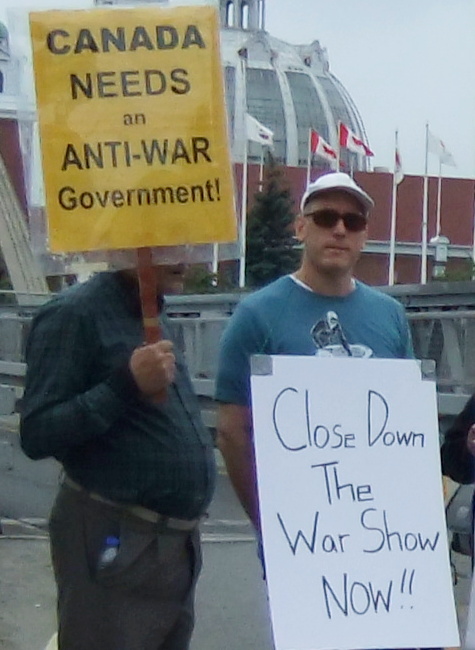
Thousands of people going to the CNE passed by. Many stopped to read the placards, to take photographs of the action, and to discuss and express their support.
One of the themes of the action
highlighted the $77 billion Canada is spending on new F-35 fighter
jets. NATO imposes such obligations on all its members, Canada
included. Weapons producers, such as Lockheed Martin based in the U.S.,
make hundreds of billions of dollars building these instruments of mass
destruction while at the same time the economies of Canada and other
NATO member countries get integrated into the U.S. war machine.
Another theme highlighted the destructive role
that the war planes celebrated by the Air Show have on the environment
and climate change. Last year, for example, the COP 26 UN Climate
Change Conference identified and condemned the U.S. armed forces as one
of the top sources of greenhouse gas emissions and destructive climate
change. And that does not take into account the rest of the aggressive
NATO alliance.
An MLPC speaker condemned the recent visit of NATO Secretary General Stoltenberg to the Arctic and the plans to militarize the Arctic under the guise of containing threats from China and Russia. Highlighting the concerns people had raised -- be it opposition to war and aggression, the state paying billions to multinational armaments producers such as Lockheed Martin or environmental degradation -- he said they all underscore the necessity to Get Canada Out of NATO and NORAD and Make Canada a Zone for Peace.
(Photos: TML)
Britain
New Prime Minister Takes Power
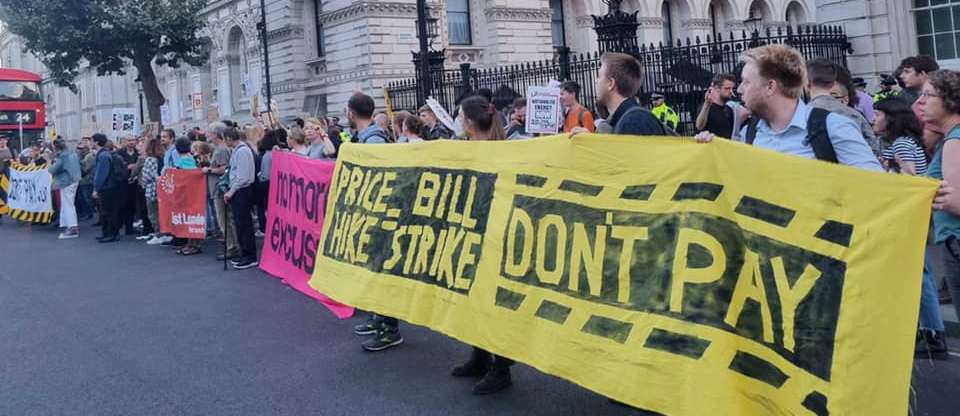
Demonstration greets new
Prime Minister outside 10 Downing Street, September 5, 2022.
On September 5, Foreign Secretary Liz Truss secured the leadership of the Conservative Party, and hence became Britain's new Prime Minister. On September 6, Boris Johnson tendered his resignation to Queen Elizabeth II at Balmoral Castle in Scotland. Liz Truss kissed the Queen's hand and was invited by her to form a government.
As a student at Oxford University, Liz Truss was President of the Oxford University Liberal Democrats and stood for ending the monarchy. She went out of her way in this election and post-election to say that she campaigned as a Conservative and will rule as a Conservative. This is diversion because the past she is not putting behind her is her yeoman's service as a warmongering Foreign Secretary and that she is staying the course despite the disasters Britain's neo-liberal policy has brought about, both at home and abroad.
Truss's win was less than spectacular. She garnered the support of fewer Conservative members than any of her predecessors. Under the party's current leadership rules, introduced in 1998, those participating in the election were only the fully paid-up members of the Conservative Party, numbering, it is said, little more than 160,000. In prevailing over contender Rishi Sunak, the former Chancellor of the Exchequer, Truss received 81,326 of these votes amounting to 57 per cent of the votes cast. This is a smaller percentage than those of her predecessors Iain Duncan Smith, David Cameron and Boris Johnson who won 61, 68 and 66 per cent respectively, which did not help their claim to speak on behalf of the people of Britain much either.
In the ongoing crisis of the anachronistic liberal democratic institutions in Britain, to have the decision of who should be Prime Minister of Britain made by roughly 0.2 per cent of the population of the UK deepens the crisis of legitimacy in which these institutions are mired. That the Prime Minister in no way speaks for the people and is not seen to represent their claims on society is more glaringly apparent than ever. Tory Party chief executive Darren Mott went so far as to write a response to the media newsroom Tortoise that the Party "does not carry out public functions." The election was "a private matter for the members of the Party," Mott wrote, adding that the appointment of the Prime Minister is a matter for the sovereign, not the Party!
The viciousness of the campaign demonstrated, should demonstration be needed, that the Conservative Party is a sorry excuse for a Party. There is nothing modern about it. It has no defined political line or mechanisms for sorting out differences within its ranks. Character assassination and boorishness marked the campaign and continued in the public exhibition over who should be appointed by Truss to her Cabinet. Former Home Secretary Priti Patel resigned by means of a tweet while Boris Johnson was still Prime Minister. The Conservative Co-chair, Ben Elliot, also quit just hours after the result was announced. As expected, Truss's new cabinet excludes the main backers of her rival Rishi Sunak.
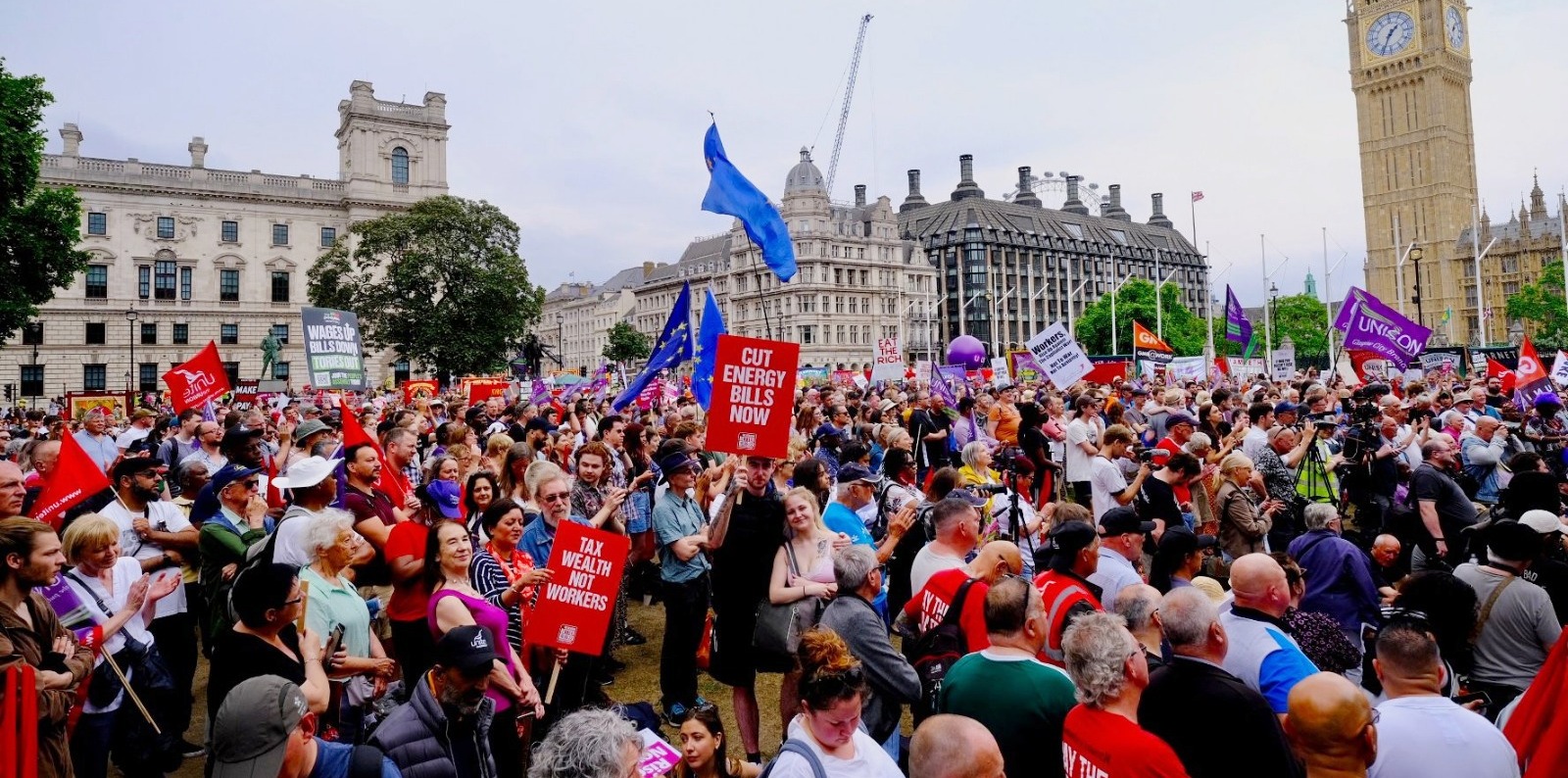
London rally June 18,
2022 declares Enough
Is Enough!
This government is crisis-ridden because it serves narrow private interests, and the institutions are incapable of dealing with the demands of history at this time which are for peace, freedom and democracy, not governments of police powers which commit crimes against the peace and against humanity, and destroy whatever they cannot control. The more power is concentrated in executives which are out of the reach of the people, the more the people feel the absence of their own political power. Already Truss has announced a crackdown on unions in the coming period which will certainly not go over well either. The Communication Workers' Union, among others, pointed out that Truss becomes Prime Minister with the backing of less than the threshold she plans to require for unions to be able to call a strike.
On the issue of the north of Ireland, in the context of the Irish people's striving for unity and independence, it is clear enough that a political solution will not be entertained and the demands of the people will continue to be treated as law and order problems. History has already condemned the British state for this, many times over.
Underscoring the failure of the sanctions against Russia and the resultant energy crisis -- for which the British in lock-step with the U.S./NATO alliance are responsible -- Truss vowed she will tackle the energy crisis "once and for all." Households will save £1,000 a year under an energy bills price freeze, she said. This has done nothing to mitigate the mass rallies and demonstrations taking place across Britain and all of Europe demanding the energy crisis be resolved by ending the sanctions against Russia.
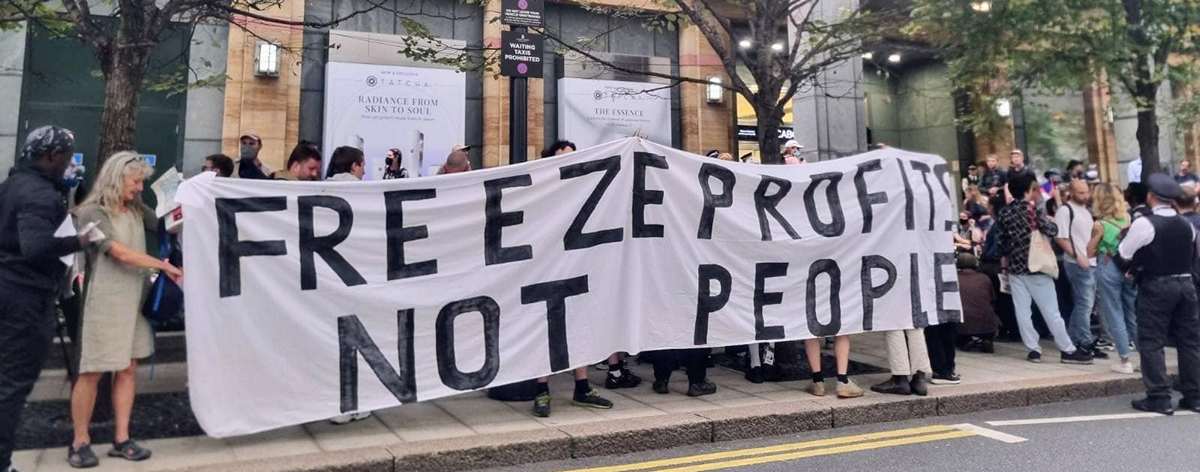
Truss's tenure as Foreign Secretary shows that the narrow private interests she serves will stay the course of fueling brinkmanship, warmongering and disinformation while attacking the claims of the working class and immigrants at home. Truss pledged her readiness to use nuclear weapons and, according to reports, her first act as Prime Minister will be to write "Letters of Last Resort" for the commanders of Britain's nuclear-weapons-carrying submarines. Truss also committed to keeping Britain's Trident nuclear submarines and to boosting military spending to three per cent of GDP by 2030.
These attempts to unite the military in Britain are bound to fail because they are hollow. Cobbling all her pledges together do not make a nation-building project by any stretch of the imagination. They merely underscore the anarchy and violence which are the result of the nation-wrecking agenda of the international financial oligarchy of which various contingents are British, each seeking to make a killing on the basis of expediency.
Truss's exhortations are in vain. They indicate that Britain's crisis is so profound, the ruling class has been incapable of finding a champion who can rally the ruling class itself, let alone the people of Britain.
Truss is known for bypassing the old forms of political decision-making and attempting to foster the illusion of a personal connection between those in power and the electorate. The people find out what she is up to through tweets. Furthermore, her declaration that she campaigned as a Conservative and will govern as a Conservative confirms that she will give the problems the people face short shrift.
Her repetition of "We will deliver" at the end of her first speech, without saying what it is that the government will deliver, is another ominous sign. Tony Blair on winning the 2001 general election famously said that he regarded the result as an "instruction to deliver." He appointed deliverologist Michael Barber to head his "Delivery Unit." It delivered the privatization of health care and the jobs of the civil service along with the destruction of manufacturing, social programs and public infrastructure. Former Conservative Prime Minister Margaret Thatcher's dictum that there is no such thing as society prevails as working people experience the rules set by the ruling elites, which are stacked against them.
Internationally, Truss has been adept at making enemies, particularly in the European Union, prompting the spokesperson of the German ruling party to say: "But anyone who believed that things could not get any worse after Johnson is being proved wrong. Many of Truss's statements are unfortunate or wrong." It was only in August that Truss, in her role as Foreign Secretary, launched legal proceedings against Brussels over the delay in granting the UK associated status in Horizon Europe, the EU's flagship research program, which Brussels has put on hold until issues related to the Northern Ireland Protocol have been resolved. Legislation to overturn the Northern Ireland Protocol, which the Johnson government had duly signed in negotiations with the EU, is still passing through the British parliament.
What is certain is that the legitimacy of an outdated political system cannot be salvaged. No matter what actions the Liz Truss government undertakes, its dysfunctionality has become a permanent feature. It is no good whistling in the wind and believing that everything will be business as usual. Failure is bound to be her legacy as it was with Boris Johnson, whose sense of entitlement brought the British institutions to their knees. Her election in no way lends the office of Prime Minister credibility, nor indeed will it lend any legitimacy to Westminster cartel party rule.
The response of the working people of Britain is ringing out loud and clear: Enough Is Enough! The people's movement for democratic renewal in which people empower themselves is emerging as the necessity. Liz Truss's election may well be one of the spurs that will tip the balance.
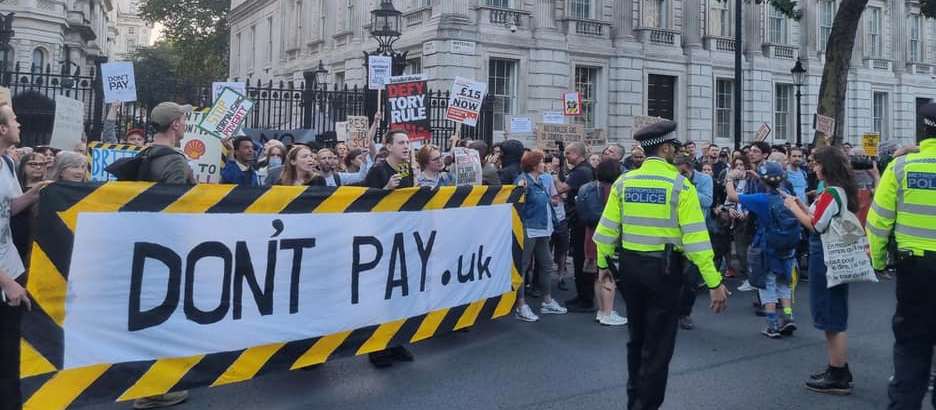
London, September 5, 2022
(Workers' Weekly, newspaper of the Revolutionary Communist Party of Britain (Marxist-Leninist). Photos: Don't Pay UK, TUC)
Strikes
Up and Down Britain
Declare
Enough
Is Enough!

The strike struggles that have been developing in scope and momentum around Britain are a sure sign that working people have had enough of being treated as things and not as human beings with their rights and interests.
The intensification of the anti-social
offensive and privatization, with the cost-of-living crisis causing
devastation for working people, as inflation soars and energy prices
spiral upwards, has prompted the call that Enough is Enough!
Resistance is growing, as rail workers set the pace in the
face of job losses and harsh real-terms pay cuts. Joining in the
resistance through strike action have been call centre workers,
lawyers, journalists, cleaners, transport workers and others. These
workers have taken a stand against facing the fastest fall in real
wages on record, while the oligarchs and monopolies who try to enforce
the will of private vested interests have overseen the theft of the new
value that workers produce on a national and international scale.
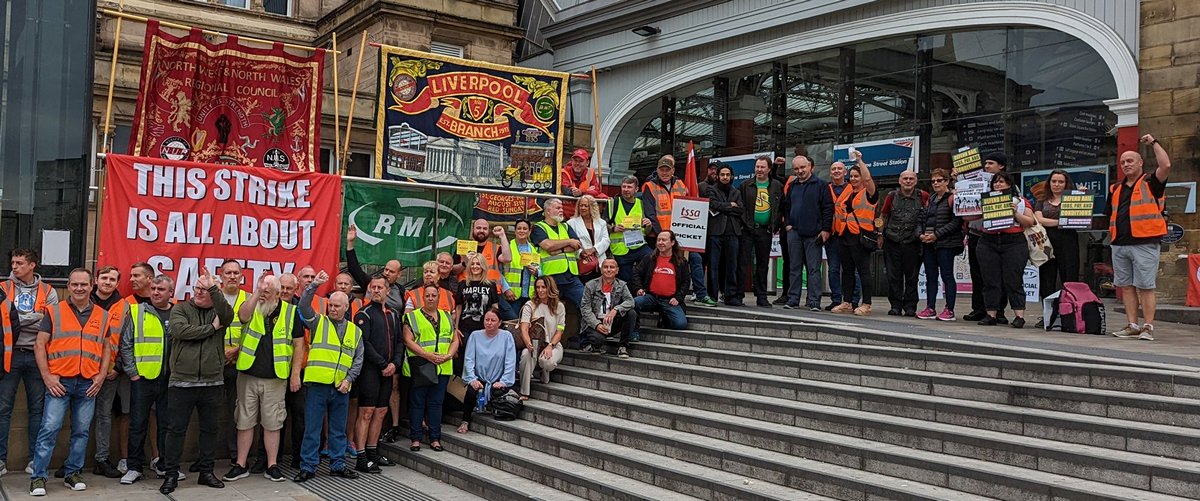 Liverpool picket by striking rail
workers.
Liverpool picket by striking rail
workers.
By stating plainly that Enough is Enough! working people are setting their sights on the goal of being in control of their own lives. The need of the times is for renewal, and the condition for this is the emancipation of the working class. This is an immediate requirement to establish the power to counter being hamstrung by the dictates of the rich, and considering that the working class and people are not human beings, but costs on a balance sheet, to be discarded where possible.
As the slogan of the Durham miners affirms, the future is in our hands, the general interests of society are the responsibility of the working class as well as are the well-being of every working person and the interests of the working class as a whole, a class in itself and for itself. In other words, only the working class can provide solutions to the problems of society, because their interests are consonant with a society which is fit for human beings. Narrow private interests are further taking over the functions of the state, privatizing what should be public functions, such as responsibility for transport, health and education.

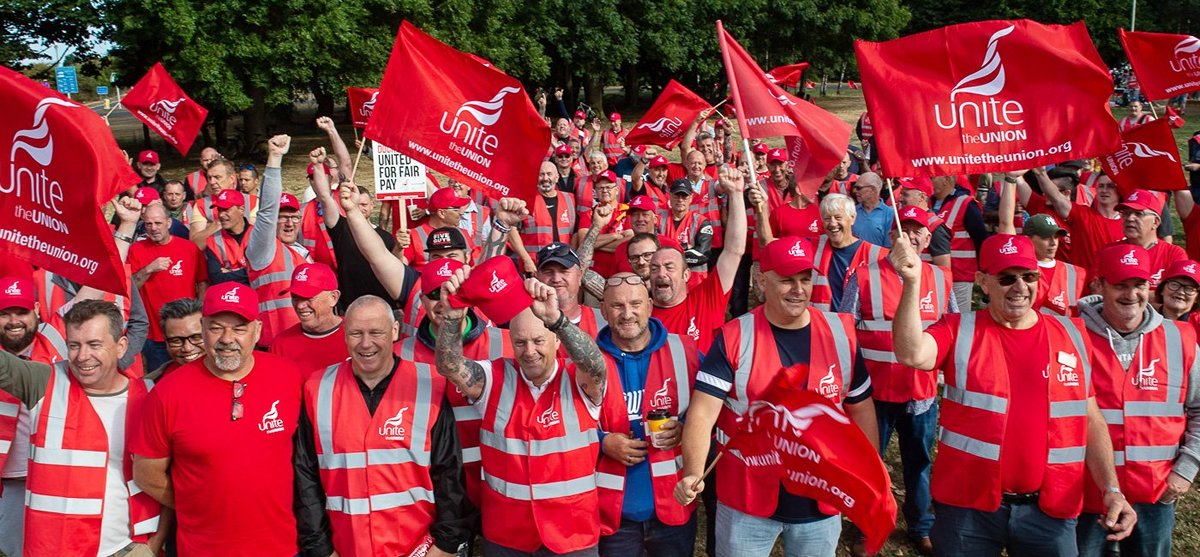
Some 2,550 dockworkers
strike at Felixstowe, Britain's busiest port.


Striking postal workers
joined on their picket by rail workers.

Striking council workers
in Ireland picket, August 18, 2022.
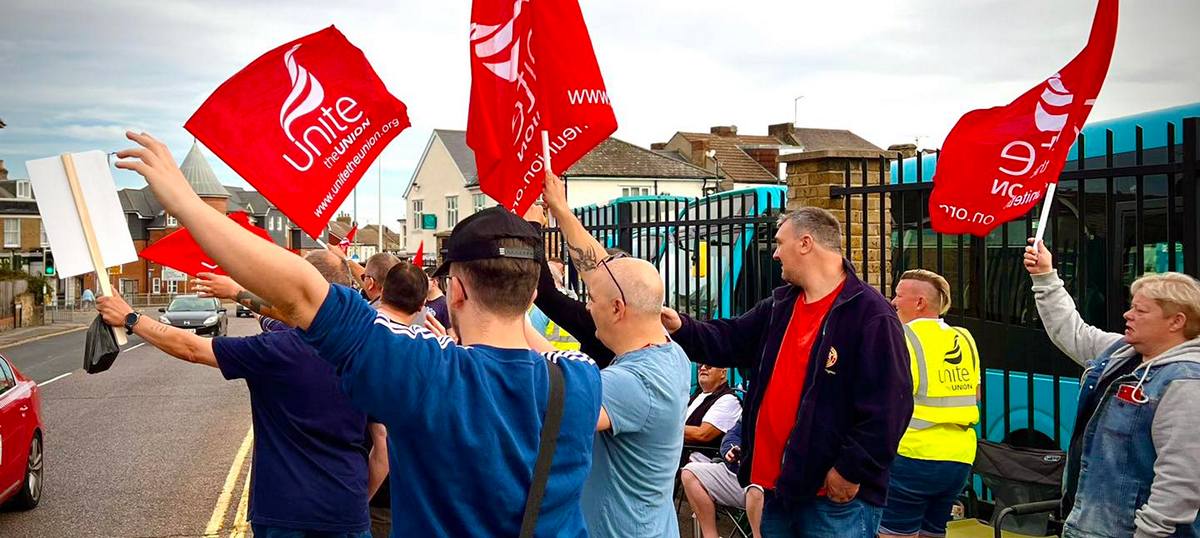 Bus drivers on strike, August 5,
2022.
Bus drivers on strike, August 5,
2022.
(Workers' Weekly. Photos: CWU, Unite the Union, G. Smallman, M. Stanton)
European Crisis
Chickens
of the 1989 Counterrevolution
Come Home to Roost
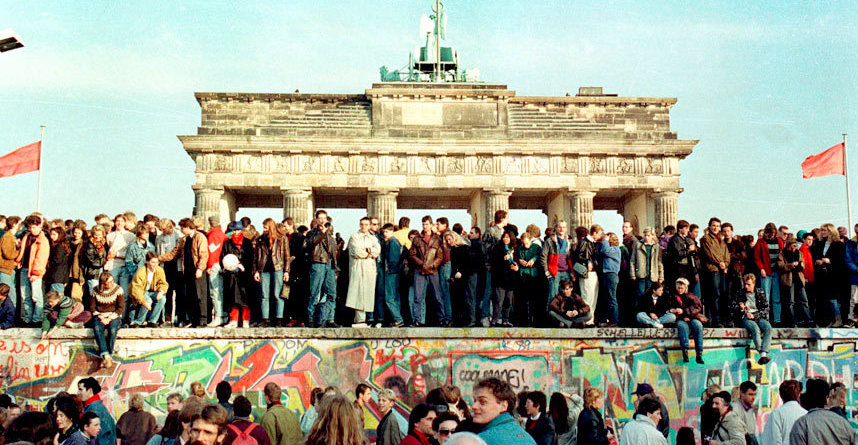
Berlin Wall, November 10, 1989, the
day after sections of it were torn down.
In 1989 the Soviet Union and its allies in eastern Europe were in the death throes of the counterrevolution to restore classic capitalism. Brimming with excitement and euphoria the imperialists hailed the Soviet restorationist leader Gorbachev as a man leading a revolution that would bring the peoples east of Germany under the control of the "West."
Retrogression on every front was indeed unfolding and soon would find expression in the now decades-long neo-liberal attack on living standards and rollback of any regulation that impeded the U.S.-led imperialists from exploiting the labour, land, resources and markets worldwide.
Privatize everything to enrich the financial oligarchy became the cry turning life upside down, immiserating the people in particular in Russia, Ukraine, the other Soviet republics and indeed throughout the world. Privatization of the infrastructure including the integrated energy systems from Siberia to Lisbon set the stage for the widespread devastation we are now witnessing.
U.S./NATO unleashed wanton destruction on all those who resisted the counterrevolution with wars of destruction in Afghanistan, Iraq, Libya, Yugoslavia, Syria and elsewhere. U.S./NATO relentlessly pushed eastward in Europe with the aim to directly seize the vast resources of Russia. A coup within the coup in 2014 against the regime in Ukraine sent the region tumbling into greater turmoil.
The subsequent U.S./NATO proxy war and sanctions against Russia is causing global economic havoc. The crisis in Europe is thrusting millions into extreme insecurity and poverty. The chickens of the 1989 counterrevolution and neo-liberal offensive have come home to roost but the people have learned a great deal since then and are determined to turn the tables on the imperialists and put them on the defensive.
Mass Demonstrations in Europe as Counterrevolution Brings Everything to a Head
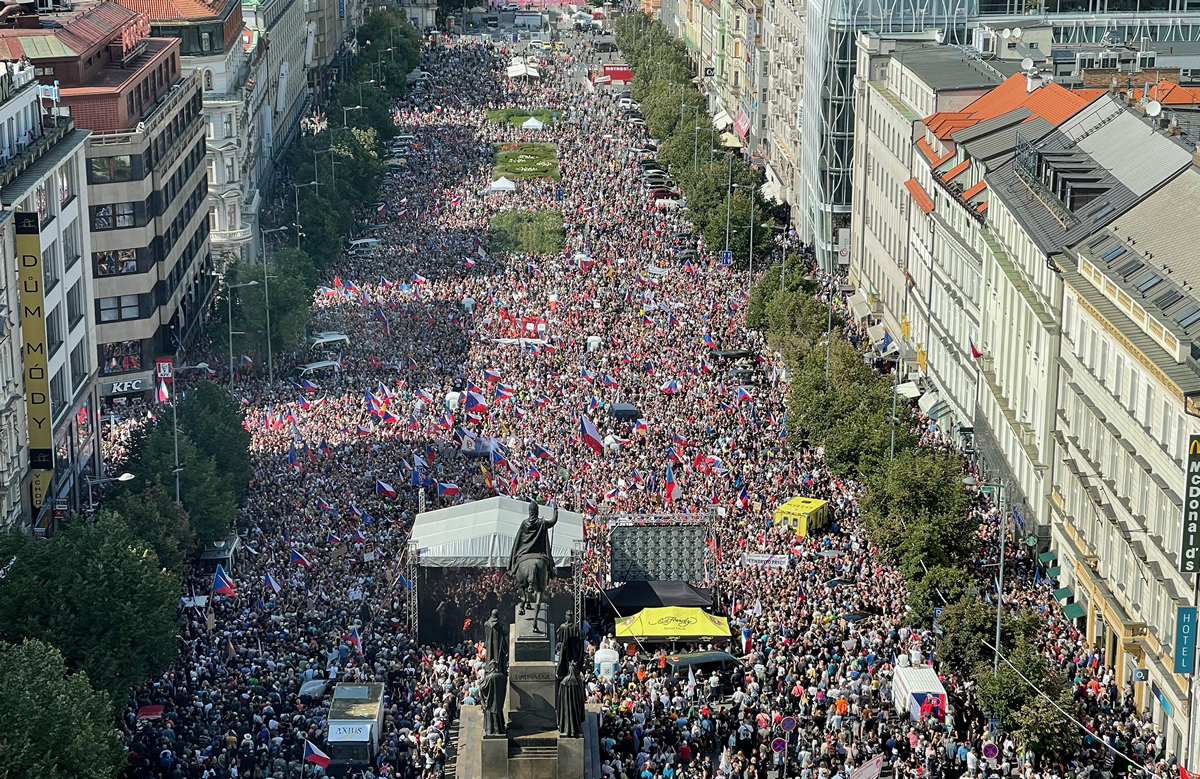
Prague, Czech
Republic, September
3, 2022
Major protests against the economic crisis and the U.S./NATO war against Russia broke out in Europe on the weekend of September 3. Throughout Europe the people reject the sharply escalating attacks on their security and standard of living and demand their rights and claims be protected.
In the UK, natural gas prices have risen nearly 96 per cent in the past year, while electricity prices are up 54 per cent. In France, electricity bills are up 40 per cent. Bloomberg News reports the wholesale price of electricity in Germany has gone up more than 500 per cent during the year.
Bloomberg notes that the economic crisis is compounded by "droughts and extreme heat across Europe [drying] up rivers and reservoirs that are crucial to hydropower supply in some countries, starving the continent of another alternative to fossil fuels. Wind generation has also been below seasonal norms, pushing up costs for near-term power."
Czech Republic
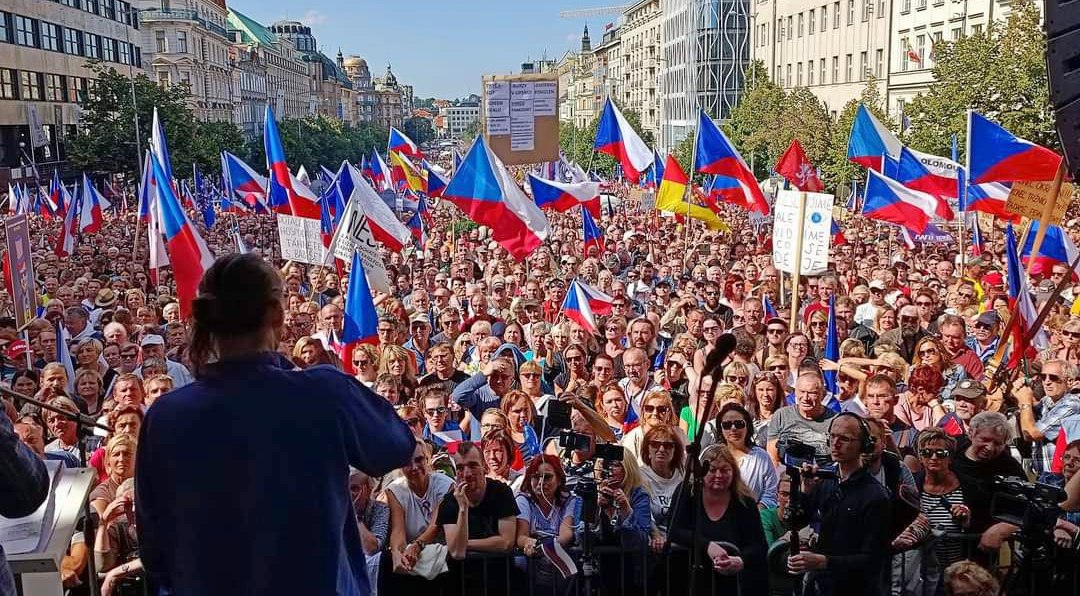
The mass protest of over 70,000 people in Wenceslas Square in central Prague, the Czech Republic on September 3 caught the attention and imagination of many. Held under the slogan "The Czech Republic First of All," demonstrators carried signs denouncing the country's membership in the EU and NATO. People demanded the country should be militarily neutral, cease arms supplies to Ukraine and ensure that direct contracts are made with gas suppliers, including Russia, so that energy prices are brought down. They called for the resignation of the current government of Prime Minister Petr Fiala for not upholding the national interest and vowed to return in larger numbers if their demands are not met. They denounced the crisis as self-inflicted because of subservience to the U.S./NATO and the worn-out forces of old Europe.
Germany
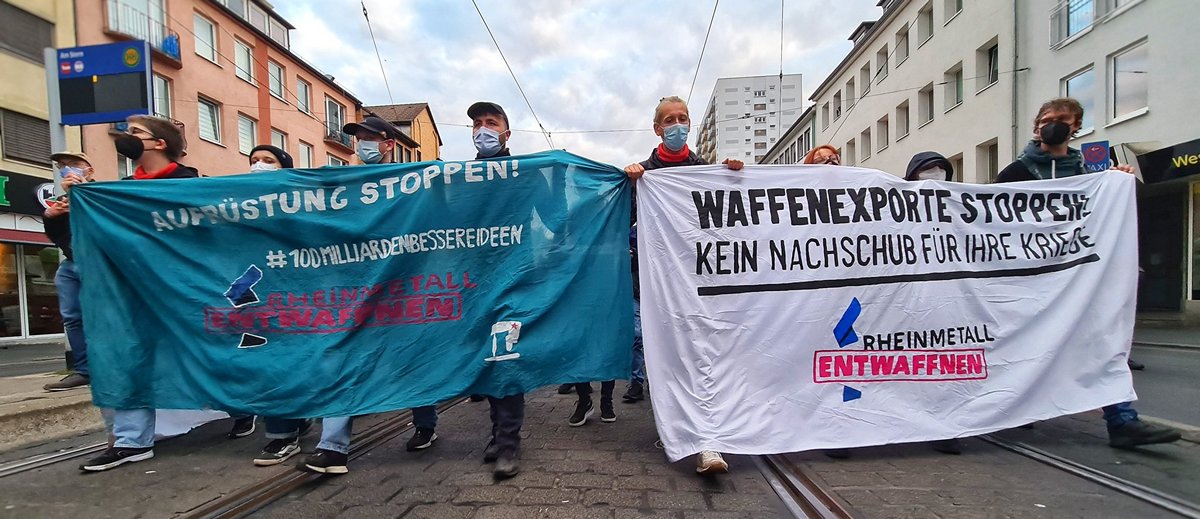
In Germany, since September 4, people in Dusseldorf, Berlin, Cologne and other cities have been protesting the energy and war crisis non-stop. They denounce the ludicrous position of the German government which blames Russia for the energy crisis, yet refuses to certify and launch the Nord Stream 2 natural gas pipeline and participates in the U.S.-led anti-Russia sanctions and the proxy war in Ukraine by sending weapons. In Kassel, the protests are demanding a ban on weapons exports to Ukraine. Mass actions blocked the entrances to the facilities of arms producer Rheinmetall and tank manufacturer Krauss-Maffei Wegmann, which are profiting from the U.S./NATO war hysteria.
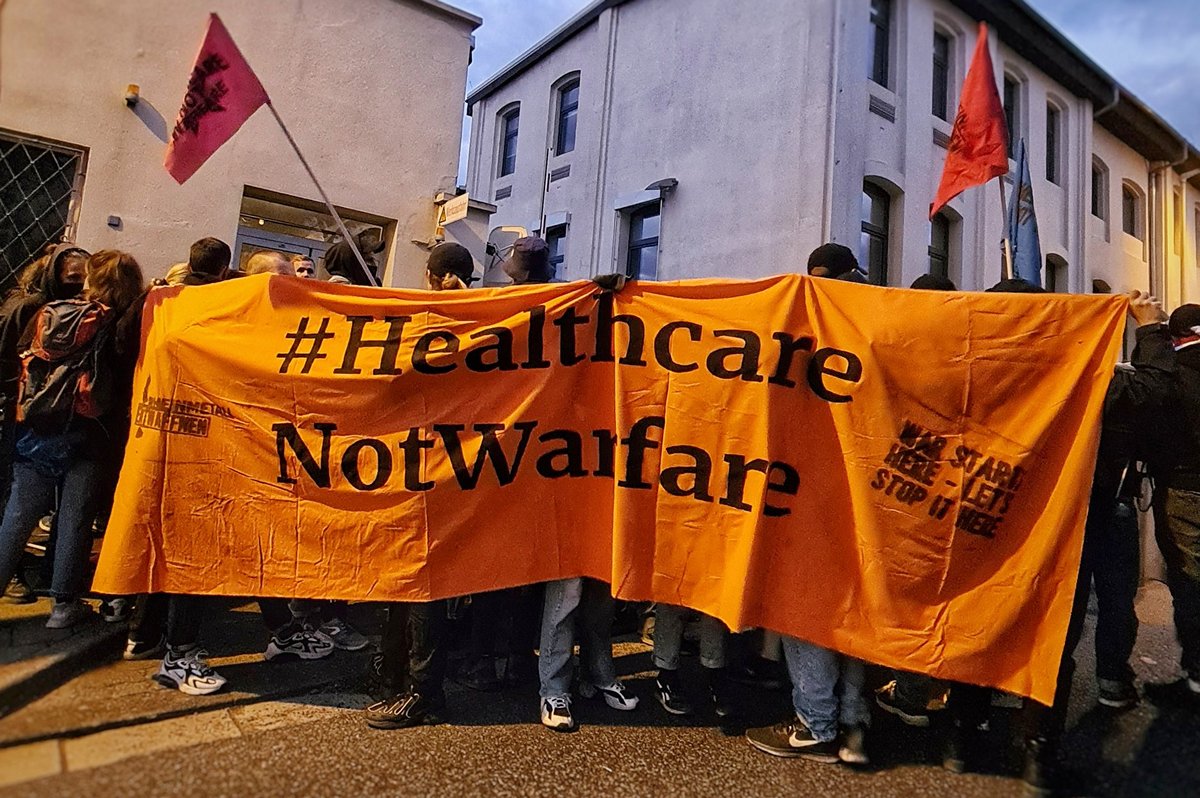
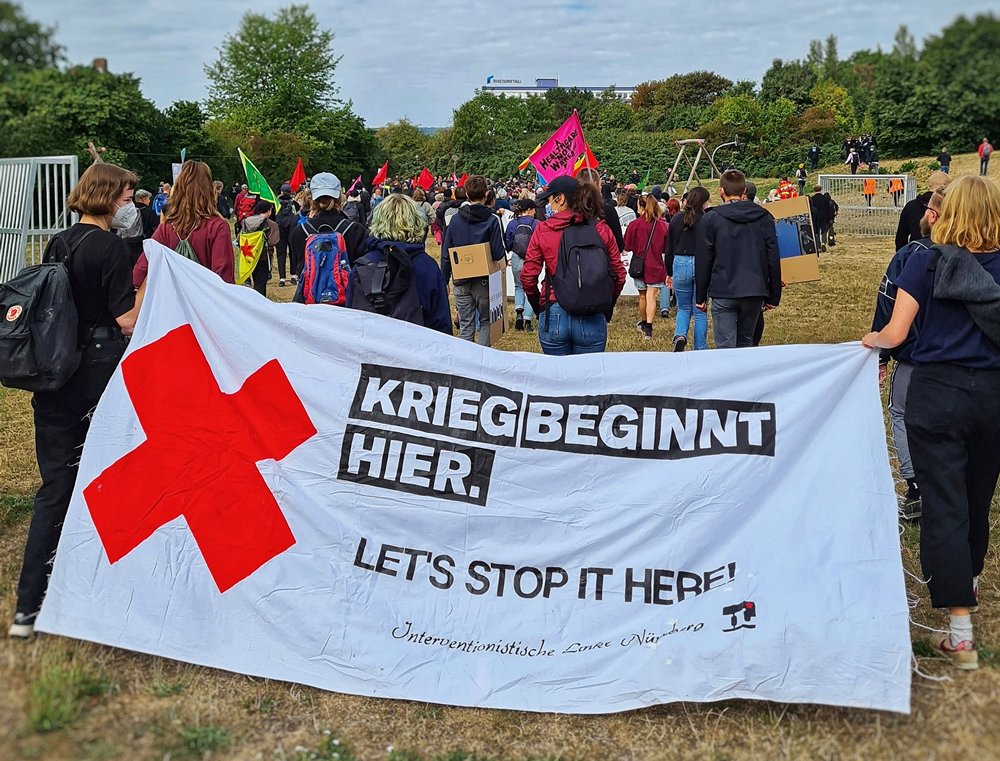
Reports suggest that many Germans are deeply concerned with the militarization of the economy and the government's practice of openly handing over money to powerful companies including the privatized energy sector. Demands have appeared in demonstrations that Germany must take the lead to disband NATO and stop the aggressive war talk and threats against Russia and China.
Italy
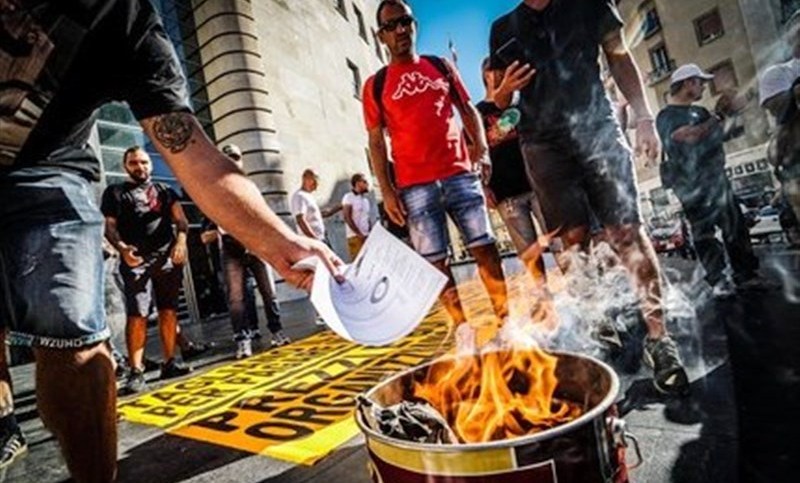
In Italy, people are refusing to pay their electricity bills and are publicly burning them in the streets. They denounce the government's promise of 15 per cent aid in payments when in fact increases are running at 300 to 400 per cent.
Moldova
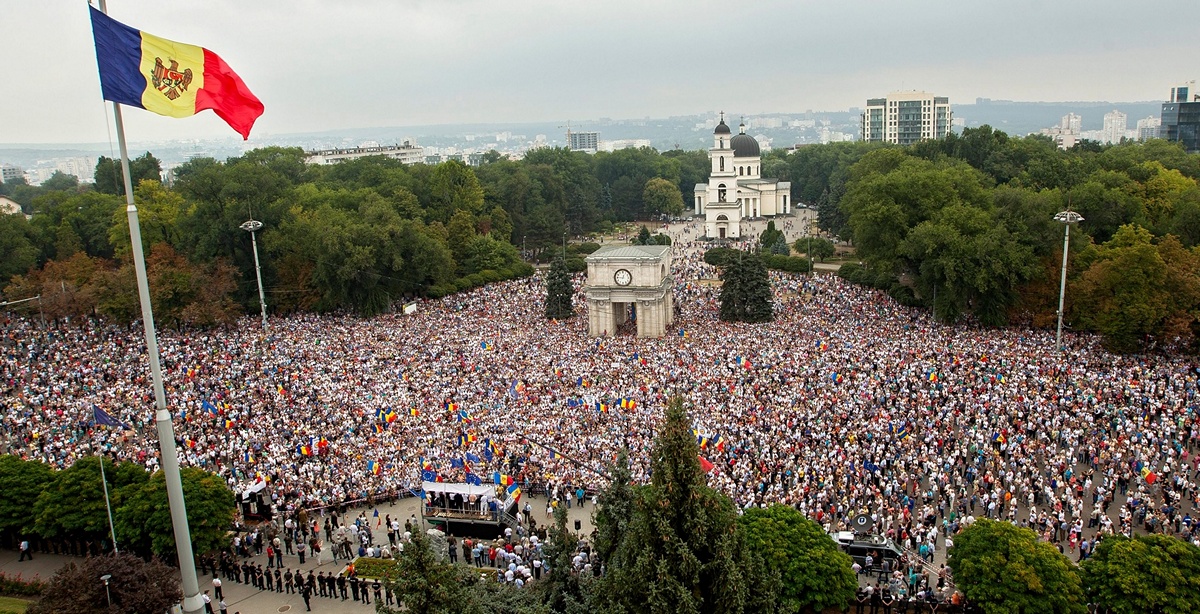
Rallies were held September 5-6 in Chisinau, Moldova demanding the resignation of the country's government and the president of Moldova for refusing to defend the people from the economic crisis. Instead they have kowtowed to the big powers in the EU and U.S./NATO through servile arrangements and have submitted to the big power pressure to enter the war against Russia. Energy prices in the country have jumped fivefold in less than a year generating havoc throughout the economy and hardship for the people.
France

A rally in Paris on September 3 denounced the economic crisis and called for the country's withdrawal from the EU and U.S./NATO. Demonstrators accused President Emmanuel Macron of refusing to defend the people and country and demanded his resignation.
(Photos: DFG, Mahesh 10816, f_philippot, In Defence of Marxism)
United States
Growing
Opposition to President Biden's
"America First" Offensive
Global industrial development and competition in all sectors including advanced technology has the U.S. imperialists striking out even at allies. The Biden administration's Inflation Reduction Act and the CHIPS and Science Act have unleashed a torrent of criticism not only from China but also south Korea and others considered U.S. friends.
Both acts hand over huge amounts of public money to favoured oligarchs. Biden himself participated in a groundbreaking ceremony at an Intel chip factory construction site in Ohio where he said, "The future of the chip industry is going to be made in America." His visit on September 9 was part of electioneering to defeat candidates of his arch enemy former President Trump in the coming November elections.
Federal and state officials have promised to cover at least one-third of any investment Intel makes in the U.S. in new production facilities. The planned budget for the new Ohio Intel semiconductor manufacturing plant alone is $20 billion with billions more slated for Arizona.
The other immediate "America First " target is electric vehicle production. The U.S. government says electric vehicles assembled in North America will be eligible for tax credits while those imported from abroad -- in particular from south Korea, Japan, the EU and southeast Asia — will suffer what amounts to special tariffs.
Even the Washington Post questioned an attack on "friendly nations such as Japan and the EU" while at the same time asking allies to support U.S. imperialism's broad sanctions and proxy wars against China, Russia, Cuba, the DPRK and others.
Bloomberg News describes the Inflation Reduction Act as a "snub against Korean-made electric vehicles" and even a "betrayal," prompting the EU to open an investigation at the World Trade Organization.
The south Korean newspaper Hankyoreh writes, "The U.S.' recent discriminatory measure against Korean-made electric vehicles has symbolically demonstrated the hypocrisy of the Biden administration's simultaneous emphasis on 'economic security alliance' as well as protectionist policies."
Hankyoreh also writes, "As the U.S. speeds up its policy of reorganizing supply chains for cutting-edge technology, such as semiconductors and batteries to centre itself, more and more Korean companies and foreign companies that were considering investing in south Korea are heading to the U.S. Korea urgently needs to devise a trade strategy that comprehensively considers the damage south Korea may incur due to 'America First'."
The U.S. ruling elite openly boast of applying pressure on others to do their bidding. U.S. Secretary of Commerce Gina Raimondo bragged to the Wall Street Journal that she successfully forced the Taiwanese semiconductor company GlobalWafers to cancel its planned investment in south Korea and instead send the money to the United States. Raimondo reportedly told the newspaper that the U.S. government would make up the huge difference in the price of constructing a new plant in Texas. Raimondo said the U.S. would "make the math work" by paying with public funds the over three times extra investment needed.
Hankyoreh writes, "With the U.S. implementing its strategy of supporting domestic companies competing with China in the cutting-edge technology sector while absorbing factories run by foreign companies into the U.S. in earnest, south Korea and other U.S. allies are taking a hit.
"With Samsung Electronics, SK and Hyundai Motors announcing trillions won in investments according to the U.S.' policies, concerns are being raised regarding the hollowing out of manufacturing in south Korea as well as jobs.
"South Korean companies are facing an impasse, with Korean-made electric vehicles made ineligible for tax credits on the one hand, as the Inflation Reduction Act stipulates that electric vehicles should be assembled in North America in order to be eligible for the tax credits; on the other hand, south Korean companies are facing U.S. regulations that forbid semiconductor companies receiving U.S. funding for factory construction from building high-tech manufacturing facilities in China for the next 10 years."
Hankyoreh complains of the "U.S.' tendency to share burdens with its allies while monopolizing benefits" but offers no new direction to escape from the impasse. It does not want to see because it lacks the courage that a new direction is staring it in the face. A reunified Korean Peninsula without U.S. military dictate in control of the south would be a powerful force for a self-reliant Korean economy serving the people and not the U.S. imperialist "America First" regime of aggressive competition and war.
People Organize Rapid Response to Federal and State-Created Water Crisis


People's Advocacy Institute volunteers organize water distribution in
Jackson, Mississippi.
The most recent boil water advisory in Jackson, Mississippi, issued in late July, was lifted September 15. From August 29 to September 5, Jackson was without water for drinking, bathing, washing, flushing toilets -- all basic needs. It was the third time in the last dozen years that the largely Black city (about 83 per cent of the population of about 150,000) has been without water. A cold snap in 2021 froze pipes and left tens of thousands of people without running water for a month and the city was under a boil water advisory for at least 225 days during the year. The problems have continued.
Requirements to boil water are so frequent that most residents have not used the water for drinking for years and are forced to buy water. Now they are standing in lines a mile long for bottled water at locations set up by the city, and even then, supplies run out. Mothers and children are being most severely impacted. The people of the city are expected to be without safe water for a year or more.
There is currently not sufficient water pressure for dealing with fires and hospitals are also having difficulties. Schools were closed and students forced back to remote internet classes. The situation was made worse by recent massive rainstorms and flooding, stemming in part from the impact of climate change.
Organizers in the city have set up additional places for bottled water at schools, fire stations, churches and other sites. The water has been secured through their own mobilizing efforts and donations from individuals and organizations across the country. Teams are also going door to door to ensure people have water as many are unable to get to the distribution locations.
Jackson residents have long been demanding and organizing to secure their right to safe water and to meet their emergency needs. A Rapid Response Network, for example, involving more than thirty organizations statewide, was on the ground even before Jackson was completely without water this time. The People's Advocacy Network has also long been organizing to involve residents in affirming their rights by making their claims on state and federal governments and by joining in local collective governance through a People's Assembly.
As is evident in the present crisis, they are not depending on the state and federal governments which have systematically refused to provide the funding needed to upgrade and modernize the city's main treatment facility, the O.B. Curtis Water Treatment Plant, and the backup facility. Even though the treatment facility supplies water to a metro area of about 180,000, including the City of Jackson, Jackson Public School District, City of Byram, two major hospitals, multiple dialysis clinics, long-term care and daycare facilities -- it has systematically been left to decay for decades.
Not only is the racism of the state and federal government evident, but so too is the complete lack of social responsibility and accountability for such a vital necessity as water. Given the relatively small size of the city and a working population where about 25 per cent live below the poverty line, the city alone cannot afford the repairs required. That is the responsibility of the state and federal governments, a duty they refuse to meet.
Mississippi Governor Tate Reeves asked for and got a declaration of emergency from the federal government, which means emergency funding and resources are available. A sizable portion of those funds will go to the Department of Homeland Security (DHS) and the Federal Emergency Management Agency (FEMA) who will now be on the scene. Few have forgotten the brutal repression, racism, toxic trailers, and concentration camps used against the people of New Orleans after Hurricane Katrina in August 2005.
As well, federal funding does not go directly to Jackson, but to the state government, which likely will keep most of whatever does not go FEMA and DHS. The lack of shame of state government is such that it has no problem with portable toilets once again being parked outside the Mississippi Capitol building because it has no water.
Not a few in Jackson are also aware that while the Pentagon yearly gets a budget of about $1 trillion, and close to a $100 billion has been sent to Ukraine for war, the $2 billion or $3 billion needed to upgrade Jackson's water treatment plant is not being provided. Instead, the Governor and other state officials are blaming the local government.
Reeves also blocked legislation in 2020 allowing Jackson to forgive unpaid water bills, a problem impacting the impoverished residents of the city. While securing emergency federal funds for the state, Reeves has not said whether he will call a special session of the state legislature to consider aid for Jackson. Otherwise, it does not meet again until January 2023.
Mississippi Rapid Response Coalition -- Water Fund
The Mississippi Rapid Response Coalition (The Coalition) has released the following statement and urges all to join in supporting the people of Jackson as they organize for their rights:
"The Coalition led by the People's Advocacy Institute, the Mississippi Poor People's Campaign, Immigrant Alliance for Justice and Equity, One Voice, MS, Alternate ROOTS, Mississippi Moves, Operation Good, Strong Arms of Mississippi and over thirty partner organizations, are working diligently to meet the clean water needs of the communities directly impacted by the deteriorating infrastructure in Jackson, Mississippi.
"After more than five decades of neglect by the State, residents in older cities, like Jackson, have been forced to carry the financial burden of fragile infrastructure and have been exposed regularly to the health risks associated with the need for constant repair. In 2021, residents were under a boil water alert for at least 225 days. In 2022, boil water requirements continue to plague an already resource constrained population. These water woes not only impact the quality of life for Jackson's residents, they also impact Jackson's economy (schools, businesses, etc.), further strangling an already under-resourced city.
"The Coalition has a goal of raising a minimum of $2 million to provide clean water to residents. We know that these rapid response funds are only a fraction of what will be needed to fix the infrastructure problems in Jackson. A lasting and long-term solution requires that the State government provide the investments they have willfully neglected to provide. In the meantime, The Coalition, which is made up of over 30 Mississippi-based organizations, is providing water relief to reduce the harm.
"The Coalition is asking you to give -- and asking you to ask your friends and neighbours to give -- to help us reach our goal of $2 million dollars. Funds raised will be used to purchase water, transport water to households, purchase reusable water containers, water filters and other items needed during what is expected to be at least a year without safe water. If you prefer to donate items directly, please email rapidresponse@peoplesadvocacyinstitute.com."
For more information about the People's Advocacy Institute and the Mississippi Rapid Response Coalition click here.
The People's Advocacy Institute has also provided the following information:
For people interested in volunteering:
Copy the following address into web browser for volunteer form: Bit.ly/mrrcvolunteers
For more information text: 601.533.2445
Donations
Copy the following address into web browser to donate: Bit.ly/msresponsedonations
Water Donations
MS Rapid Response Coalition
C/O
City of Jackson
Metro Center Mall
Dillards Loading
Dock
3645 Hwy 80
Jackson, MS 39209
Contact Candace Abdul-Tawwab; candace@peoplesadvocacyinstitute.com, (240) 517-6623.
(Voice of Revolution. Photos: Peoples Advocacy Institute)
Minimum-Wage
Workers Cannot Afford
Rent in Any State
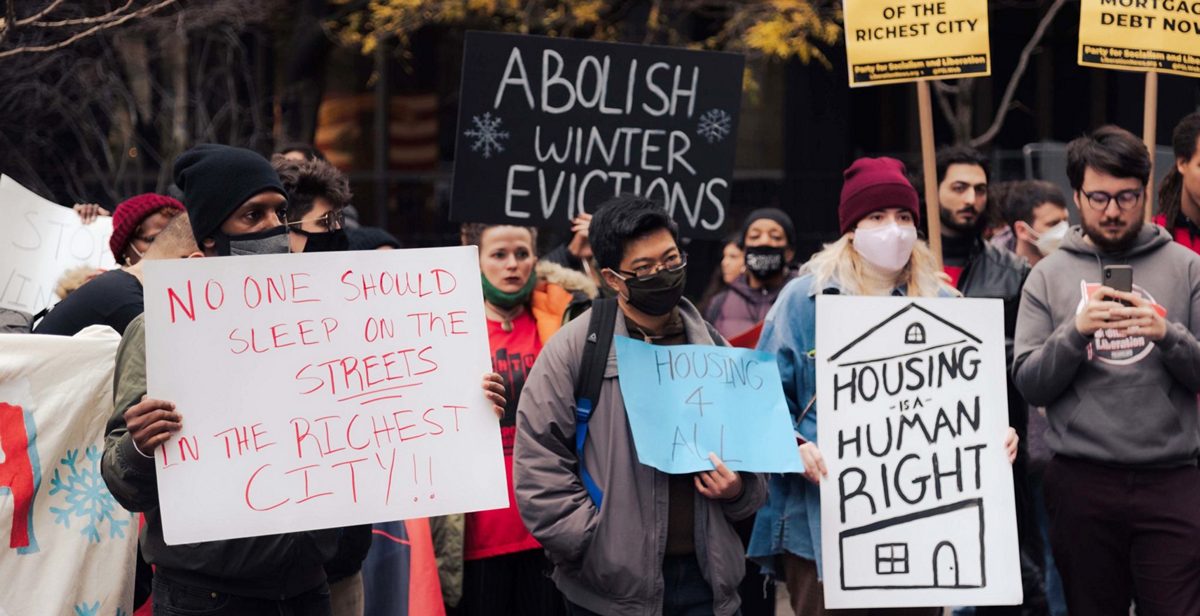
Full-time minimum wage workers cannot afford rent in any U.S. state according to a recent report, Out of Reach, by the National Low Income Housing Coalition. The report compares average rent for "modest" one and two apartments and establishes the wages required to afford such apartments. The figures for affordability are based on not spending more than 30 per cent of household income for housing.
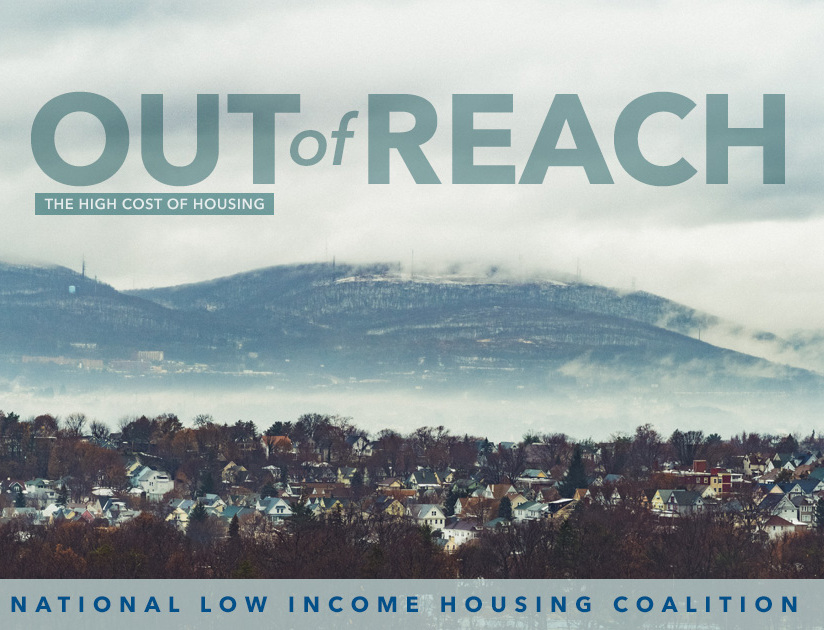 In the U.S., the "Housing Wage"
needed is $25.82 per hour for a two-bedroom rental apartment. For a
one-bedroom apartment, it is $21.25. This means the two-bedroom Housing
Wage needed is more than 3.5 times greater than the federal minimum
wage of $7.25 an hour.
In the U.S., the "Housing Wage"
needed is $25.82 per hour for a two-bedroom rental apartment. For a
one-bedroom apartment, it is $21.25. This means the two-bedroom Housing
Wage needed is more than 3.5 times greater than the federal minimum
wage of $7.25 an hour.
As a result of persistent struggle by workers, thirty states, the District of Columbia, and more than 50 counties and municipalities now have minimum wages higher than the federal minimum wage. However, even in these areas with a higher minimum, such as $15 per hour, wages are not sufficient to afford a one-bedroom rental apartment on a 40-hour workweek. It is estimated that the average worker would need 96-hour workweeks for 52 weeks per year to afford a two-bedroom apartment or rental home -- equivalent to about two-and-a-half full-time jobs. Such a workweek, assuming eight hours for sleep, leaves about two hours for everything else. For the overwhelming majority, not even sharing a dual income with a federal minimum wage-earning partner would cover a two-bedroom rental in their state.
The federal minimum has not been raised since 2009, does not keep up with inflation, especially in the current situation, and keeps full-time workers impoverished. In 1968, for example, the federal minimum wage was equivalent to $13.16 in 2022 dollars -- nearly $6 higher than the minimum today. Today's minimum is worth about 38 per cent less than in 1968 and 21 per cent less than 2009.
There are at least 1 million workers getting paid the federal minimum wage or less. Workers under age 25, who represent just under one-fifth of hourly paid workers, make up 48 per cent of those paid the federal minimum wage or less.
Workers have long fought to raise the federal minimum wage, which is supposed to provide the minimum needed for workers to have a U.S. standard of living. While workers consider that the minimum should be equal to the average wage of industrial workers, evidently the government thinks poverty-level wages should be standard.
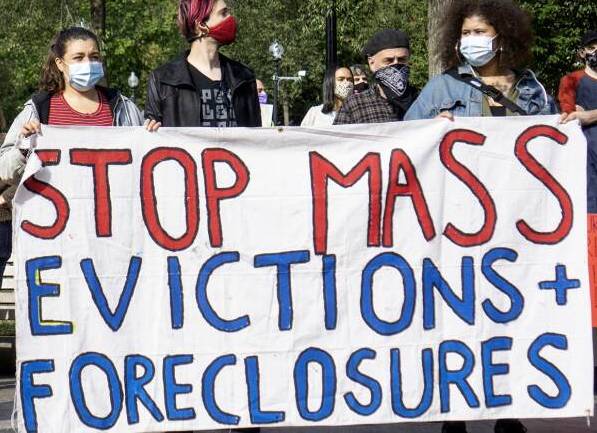 The refusal to raise the
minimum directly aids the giant oligopolies that steal the wealth
produced by the workers. As with all wages, the minimum wage has not
kept up with productivity growth -- that is the growth in wealth
produced by the workers, who generally everywhere work more for less.
Had the minimum wage kept up with productivity, it would be $22 per
hour.
The refusal to raise the
minimum directly aids the giant oligopolies that steal the wealth
produced by the workers. As with all wages, the minimum wage has not
kept up with productivity growth -- that is the growth in wealth
produced by the workers, who generally everywhere work more for less.
Had the minimum wage kept up with productivity, it would be $22 per
hour.
The report brings out that eleven of the country's largest occupations, accounting for more than one-third of all workers, pay median wages that are less than the one-bedroom Housing Wage of $21.25 per hour. In most areas, a family of four with the poverty-level household income provided by the minimum wage can afford a monthly rent of no more than $694. That is assuming the household can manage to spend as much as 30 per cent of its income on housing. The average monthly rents for one-bedroom or two-bedroom apartments are $1,105 and $1,342, respectively.
Individuals with disabilities relying on federal Supplemental Security Income (SSI) can afford a monthly rent of only $252. A household receiving the average unemployment insurance benefit can afford a rent of no more than $529 per month. Since unemployment insurance is determined by an individual's past wages, workers who had been making the minimum wage before losing their jobs receive even less.
Many workers across the United States, such as at Amazon, Starbucks, Trader Joe's, and fast food restaurants are organizing and rightly demanding higher wages and safe working conditions. Workers are putting forward the need for a minimum wage of $25-$30 per hour and that government guarantee that no worker or family is forced to live in poverty.
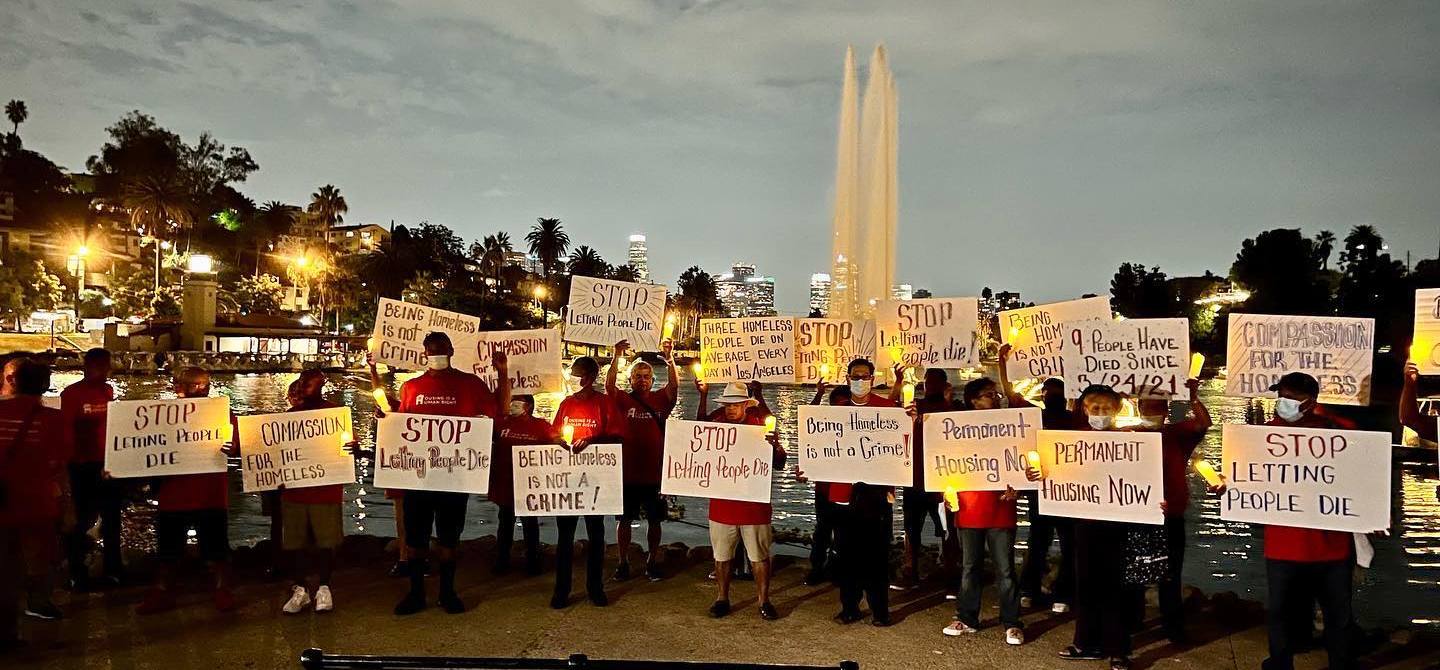
Memorial in Los Angeles,
September 8, 2022 to some 1,500 homeless who have died over the past
two years, demanding action be taken to end homelessness.
(Voice of Revolution. Photos: Peoples Dispatch, J. McKim, National Low Income Housing Coalition, Housing Is a Right)
Tsunami of Shutoffs Expected for 20 Million Families Behind on Energy Bills
Millions of families across the U.S. are facing utility shutoffs for heat and electricity. The costs for both have soared. As the major energy oligopolies, such as Exxon, reap billions in profit, families are forced to go without heat or, during recent heatwaves, air conditioning.
It is currently estimated that 20 million homes across the U.S. -- about one in six homes -- have fallen behind on their utility bills. Power bills for many have more than doubled over the past year. The average price people pay for electricity increased 15 per cent in July from a year earlier, the largest 12-month increase since 2006. And most expect these increases will continue.
U.S. households owe about $16 billion in late energy bills, double the pre-pandemic total. The average balance owed has increased 97 per cent since 2019, to $792. According to the National Energy Assistance Directors Association, it is the worst crisis the group has ever documented. A main reason is the giant surge in electricity and natural gas prices, set by these oligopolies. A tsunami of shutoffs for millions is now expected.
While millions face shutoffs, the energy oligopolies continue to rob tens of billions of dollars of the wealth produced by the workers. The second quarter for 2022 alone showed more record profits. ExxonMobil grabbed $17.9 billion, its largest-ever quarterly profit. Chevron also secured huge amounts.
The record profits are not reserved for U.S. oligopolies alone. British Petroleum (BP) posted profits of $8.5 billion, its biggest grab in 14 years. London-based Shell and France's TotalEnergies also recorded similar results. Put together, these five major oligopolies plundered $55 billion in just the second quarter, as hundreds of millions of people around the world bore the brunt of the surging prices these oligopolies set.
For the U.S., while rates vary from state to state, everywhere people have faced big increases. California's PG&E Corporation has seen a more than 40 per cent jump since February 2020 in the number of residential customers behind on payments. New Jersey's Public Service Enterprise Group, a private corporation, has more than 30 per cent of families at least 90 days late -- and that is just since March. Similar figures exist across the country.
In the U.S. most utilities, like electricity and natural gas for heating, are private monopolies, able to set prices because of their monopoly position in the economy. The government, far from guaranteeing there are no shutoffs of these necessities, instead provides funds to the private utilities for what they say is assistance to families. But like most government subsidies to the rich, including many of the COVID-related funds, there is no guarantee people will actually benefit. In addition, state regulators often allow these private utilities to recover their losses by adding a charge for people who can pay their bills, alongside providing public funds. While state regulators play a role in setting prices, it is rare that they block requests by the monopolies for increases.
Heatwaves like those experienced this year, with 100 million people facing heat alerts, are also heightening the risk that, for some people, losing power will prove fatal. Currently 41 states have some sort of protection against utility shutoffs during the winter, commonly only that the shut off is postponed, not eliminated. Only 19 states have laws or regulations preventing disconnections in sweltering hot weather. Already, on average there were 188 heat-related deaths a year in the U.S. from 2017 through 2021, up from an average of 81 in the five years before that. Many are seniors, forced to fend for themselves.
In many cities, like Detroit, people have fought for moratoriums on water and utility shutoffs and secured them. As well, during COVID, some states had moratoriums. However, like Detroit, many of them are now ending. Organizing to demand the human rights to electricity, heat, and water is increasing. One way for the government to guarantee no shutoffs is to nationalize all utilities and make them public enterprises serving the public interest.
(Voice of Revolution)
Colombia
Investiture of New President, Vice-President
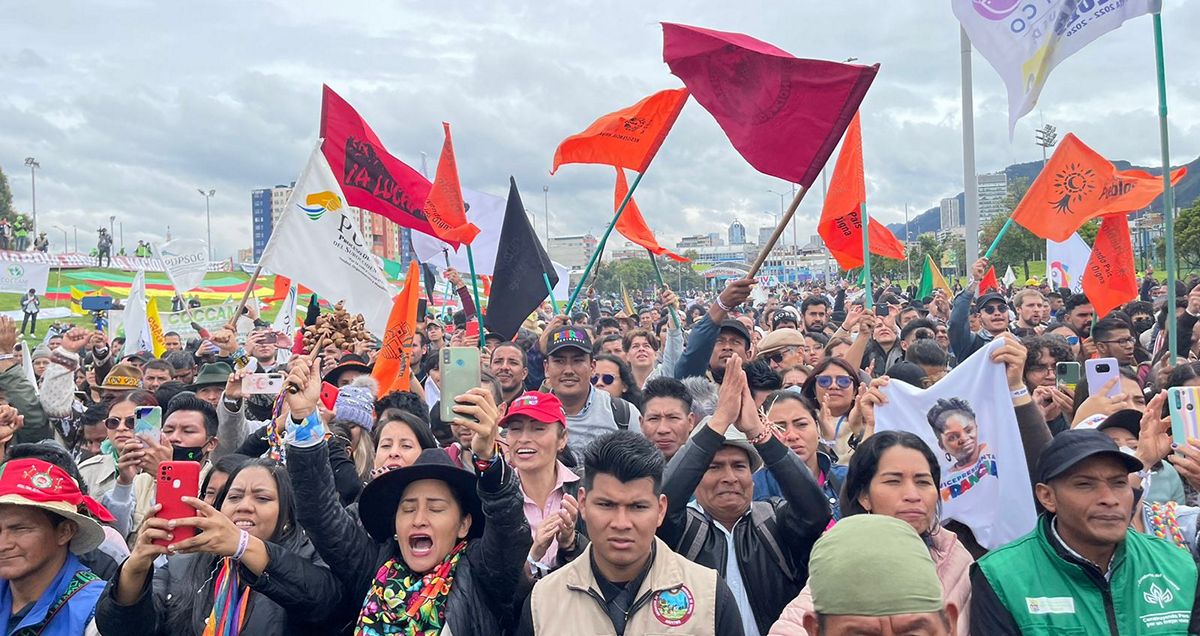
Gustavo Petro
and Francia Márquez, elected as Colombia's new president and
vice president on June 19, were officially sworn in on August 7. The
ceremony took place in Bogotá's Bolívar Square
before thousands of cheering supporters, invited guests and members of
the public. Both were also sworn in symbolically by representatives of
the peoples' forces during the days leading up to the official
event.
Swearing
In By Peoples' Movements
At an ancestral ceremony in the mountains of the Sierra Nevada of Santa Marta on Colombia's Caribbean coast, Arhuaco spiritual leaders gave the president-elect a mandate to govern well and presented him with a traditional wooden staff (bastón de mando) symbolizing the authority and trust vested in him.
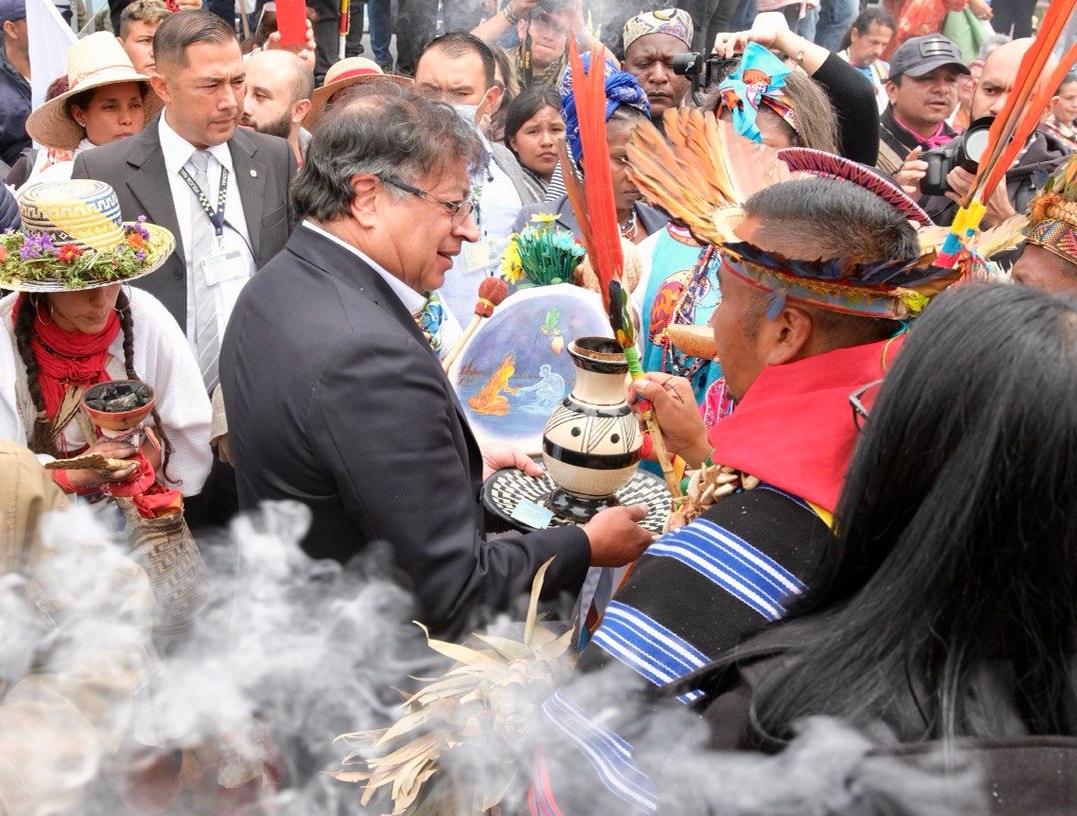 Petro and
Márquez also took part in a "popular and spiritual
swearing-in" in a Bogotá Park organized by representatives
of Colombia's Indigenous, Afrodescendent, and other diverse peoples'
movements, peasant organizations and other social movements. The
objective, organizers said, was to "fertilize the ground for the
construction and constitution of a people's power that allows the
practical exercise of political, economic and cultural sovereignty to
be within reach of all." A "people’s mandate" was read out to
them that called on Petro and Márquez to defend life,
guarantee dignified living conditions for all, protect the natural
environment, go for total peace in the country and make a drastic
change in the policy on drugs, among other things.
Petro and
Márquez also took part in a "popular and spiritual
swearing-in" in a Bogotá Park organized by representatives
of Colombia's Indigenous, Afrodescendent, and other diverse peoples'
movements, peasant organizations and other social movements. The
objective, organizers said, was to "fertilize the ground for the
construction and constitution of a people's power that allows the
practical exercise of political, economic and cultural sovereignty to
be within reach of all." A "people’s mandate" was read out to
them that called on Petro and Márquez to defend life,
guarantee dignified living conditions for all, protect the natural
environment, go for total peace in the country and make a drastic
change in the policy on drugs, among other things.
In her remarks to those gathered, Márquez said the hope for change lay not with Petro and her, but in the organized people staying active. Together we face the challenge, which will not be easy, she said, of refounding the nation so that a new one emerges centred on life and peace.
Petro said his government's role
would not be to replace or co-opt the organized people, who must retain
their autonomy as well as organize the power to ensure the mandate they
give the president they elect is carried out. Building a Colombia of
peace and justice depends on the strength and the capacity of the
people's social movements, he said.
Official Ceremony in Public Square
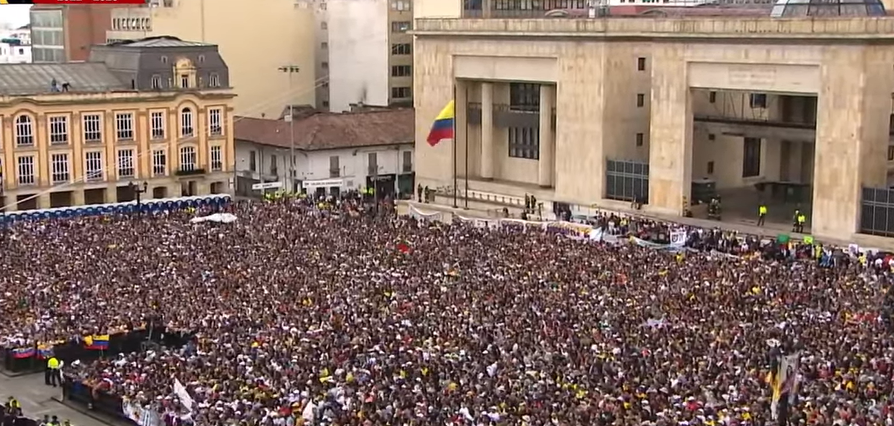
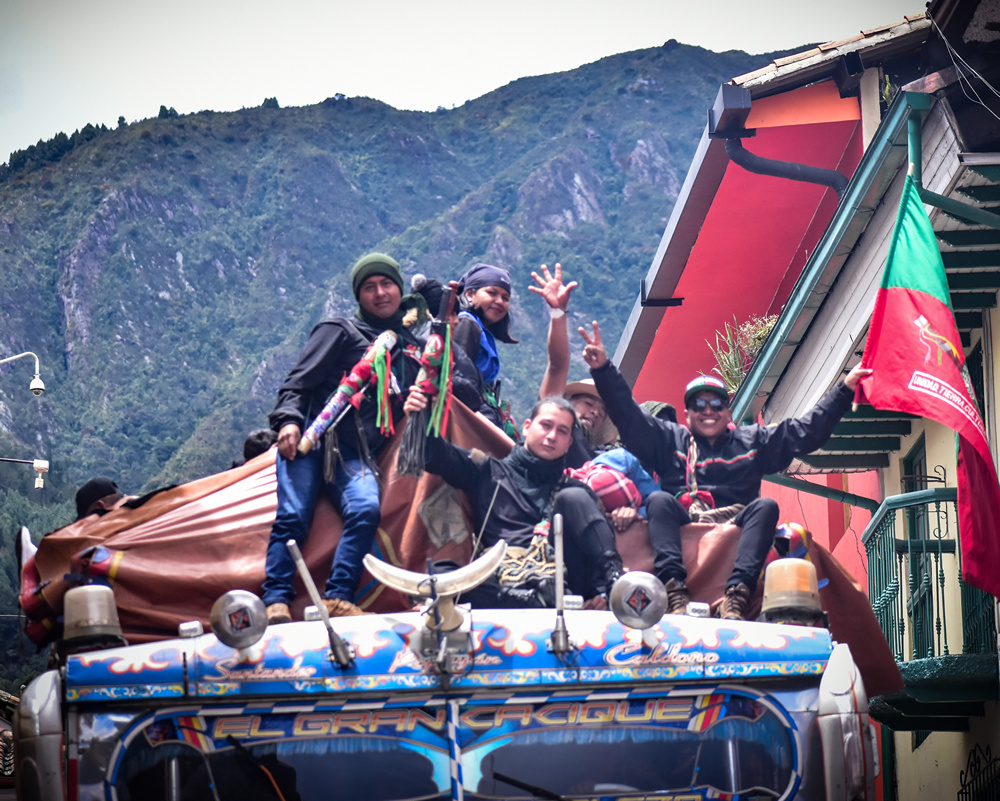 The day of the
official swearing in, people packed Bolívar Square to
capacity and filled nearby streets as well as other squares and public
spaces around the city where concerts by Colombian musical artists and
cultural performances of other types took place all day. Giant screens
were erected in many places so people could watch the performances and
celebrations taking place around the country as well as the events in
Bolívar Square on live television. Busloads of people
arrived from all over the country during the week, including many from
Indigenous territories and regions where most of the population is of
African descent -- places that Vice President Márquez has
called forgotten parts of the country -- to join in celebrating the
victory they actively contributed to.
The day of the
official swearing in, people packed Bolívar Square to
capacity and filled nearby streets as well as other squares and public
spaces around the city where concerts by Colombian musical artists and
cultural performances of other types took place all day. Giant screens
were erected in many places so people could watch the performances and
celebrations taking place around the country as well as the events in
Bolívar Square on live television. Busloads of people
arrived from all over the country during the week, including many from
Indigenous territories and regions where most of the population is of
African descent -- places that Vice President Márquez has
called forgotten parts of the country -- to join in celebrating the
victory they actively contributed to.
The public ceremony in Bolívar Square was designed to be a popular investiture and a deliberate break from the kind of protocol-heavy rituals held before an exclusive group of people, usually with an overbearing military presence, that have long been the norm. And it was. People in the crowd waved flags and banners and broke out in spontaneous chants and cheers at different points in the proceedings. One of those moments was when the presidential sash was placed on Petro by Senator María José Pizarro, the daughter of a presidential candidate assassinated in 1990 after the M-19 guerrilla organization of which he was a leader, entered into a peace agreement, disarmed and formed a political party to take up legal activity. In his youth, Petro had also been a member of M-19.
Sword of Simón
Bolívar as Symbol of the People's
Fight Today
The biggest break with tradition, however, and one filled with symbolism, came when shortly after being sworn in by the president of the Congress, Petro asked the master of ceremonies to pause the program, then issued his first presidential order. Directing himself to the military as their commander-in-chief he requested that the sword of Simón Bolívar be brought to the stage, saying it was by order of the people's mandate and "of this mandatary." The audacious move drew a loud and long cheer from the crowd, most of whom would have known that Petro had asked well in advance for the sword of the Latin American liberator to be present, but that at the last minute, outgoing president Iván Duque refused to authorize its removal from the nearby presidential palace -- a last petty act, but not one without political significance that to their delight had now backfired on him.
After about 30 minutes, with the crowd roaring its approval, the sword appeared, carried into the square in a glass display case by members of the Presidential Guard and an escort of the Indigenous Guard and of the Cimarron and Campesino Guard that protect their rural communities. As the sword passed the dignitaries' platform alongside the stage where the leaders and other representatives of several Latin American, Caribbean and other countries were seated, one person remained seated and glum-faced while the rest stood and applauded. King Felipe VI of Spain, whose royal ancestors' forces were routed by the sword's owner at the Battle of Boyacá 203 years ago that day, could not bring himself to stand.[1] His display of colonial disrespect for the independence struggles of the peoples of Latin America and the Caribbean was widely denounced by people in Spain who reminded the relic of a defeated empire that he was at the investiture to represent their country, not the House of Bourbon.
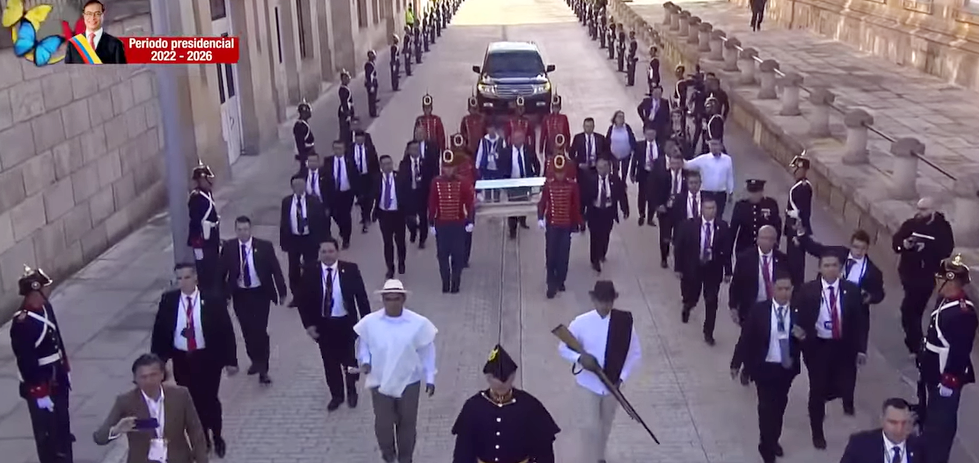
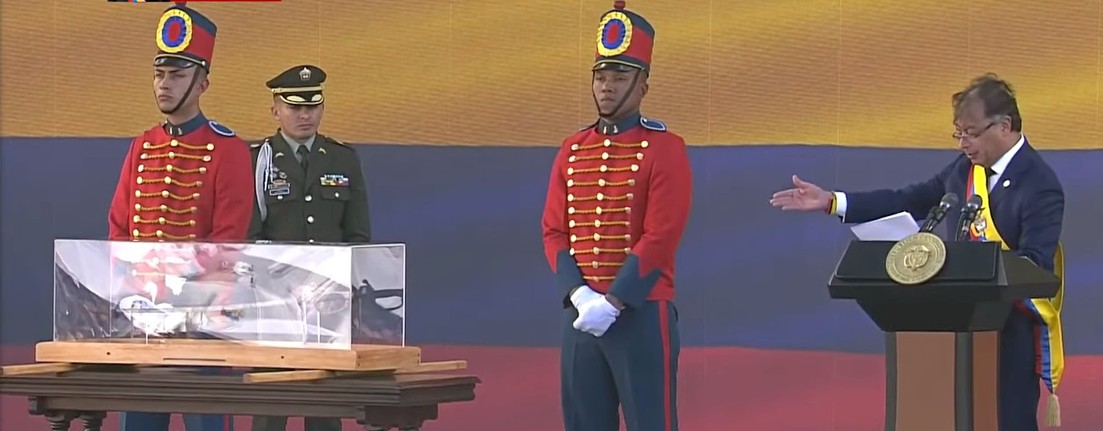
With the ceremonial sword finally on the stage where he wanted it, Petro explained, "It is the people's sword, that is why we wanted it here, at this time and in this place." He then said, to more loud roars of approval, that Bolívar's sword should remain unsheathed, in keeping with the liberator's directive that it not be sheathed until there is justice in the country. With that said, the new president began his inaugural address where he laid out his vision and plan of action for the next four years, centred around the pursuit of peace, social justice and environmental justice.
Note
1. The Battle of Boyacá on August 7, 1819 was decisive in setting the course of Bolívar's campaign to liberate Colombia, then Venezuela, Ecuador and Peru from the Spanish empire. For that reason August 7 is celebrated as a national holiday in Colombia. It is also the day on which new presidents are sworn in every four years.
New
Government
Takes Bold First Steps in
Program for "Total Peace"
Colombia's new Historic Pact coalition government, which president Gustavo Petro refers to as the government of change, has moved quickly to begin creating the conditions it hopes will allow for peace to finally prevail for a people who have lived through more than 70 years of social and armed conflict and over 200 years of uninterrupted oligarchic rule. Some of the actions the new government has taken during its first weeks in office are summarized below.
Peace Agreement to Be
Fully Implemented
A central pillar of
the program Petro and Vice President Francia Márquez were
elected to fulfil was their commitment to fully implement the
comprehensive Peace Agreement between the Colombian state and the
former Revolutionary Armed Forces of Colombia (FARC). Signed six years
ago, former president Iván Duque and his government
implemented very little of the Agreement, working instead to sabotage
peace.
Resumption of Talks
with ELN, Amends Made to Cuba
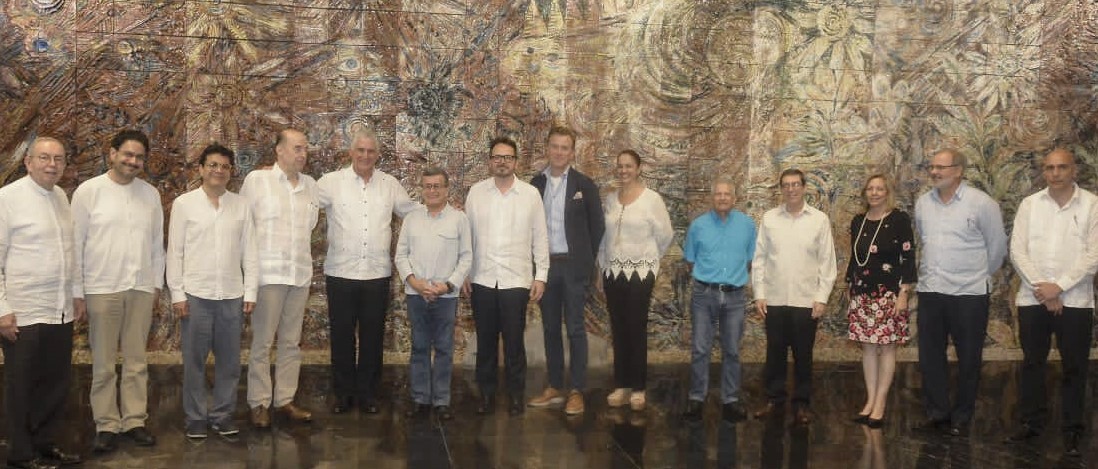 Delegation
from Colombia travels to Havana, Cuba, August 12, 2022, to discuss
reopening of
Delegation
from Colombia travels to Havana, Cuba, August 12, 2022, to discuss
reopening of
negotiations with the ELN.
Petro and Márquez also committed to resuming negotiations with the National Liberation Army (ELN) which Duque unilaterally called off in 2019. During the new government's first week in office, a delegation led by Foreign Minister Alvaro Leyva travelled to Havana to meet with Cuban government officials and ELN's negotiators to explore reopening negotiations between the Colombian government and the ELN. After shutting down the previous talks which Cuba had been hosting, Duque had arrest warrants issued for the ELN negotiating team, labelling them "terrorists," and requested they be extradited to Colombia. Cuba, in strict compliance with its obligations as host and guarantor of the talks, refused to extradite the ten-member team which would have violated not only the agreed protocols in the event of a breakdown in negotiations but international law.
Cuba's legitimate stand was quickly seized upon by the Trump administration and used as a pretext to place Cuba on the spurious U.S. “list of state sponsors of terrorism,” enabling it to pile even more restrictions and hardships on the Cuban people on top of those due to the blockade. Acknowledging Colombia had amends to make for the harm done by the former government acting as a tool of the U.S. war against Cuba, Minister Leyva made a point of stating on behalf of the Colombian government that it rejected Cuba's inclusion on the U.S. "sponsors of terrorism” list. He thanked Cuba for firmly sticking to its principles despite the extortion and damages it entailed.
Shortly after this, President
Petro announced that his government was ready to reopen negotiations
with the ELN and that he had suspended the arrest orders and
extradition requests for its negotiators who were now free to return to
Colombia to meet with their organization. At the same time he
reiterated his invitation to other armed groups operating outside the
law to negotiate their possible demobilization and disarmament, which
many have expressed a willingness to do. Some have indicated that they
are also prepared to go along with Petro's proposal of a multilateral
cessation of hostilities to create conditions for talks to commence.
Restoration of Diplomatic and Trade
Relations with Venezuela
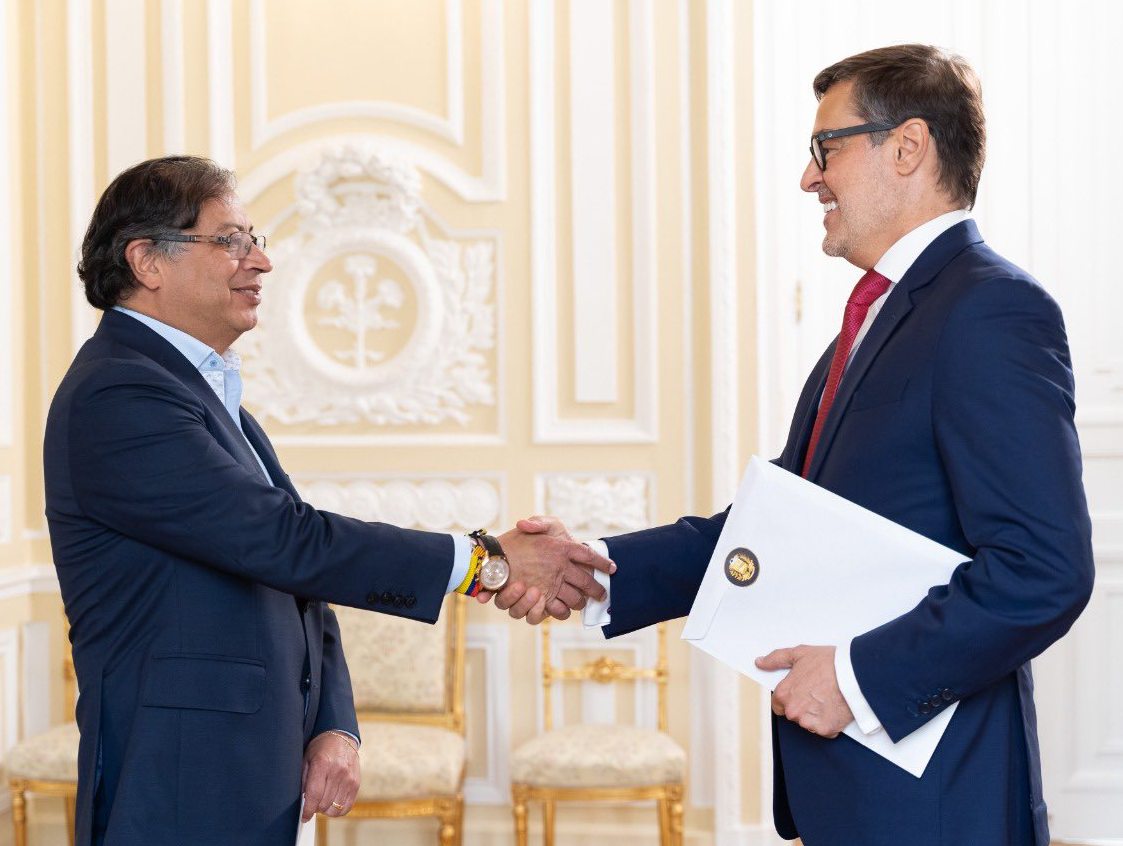
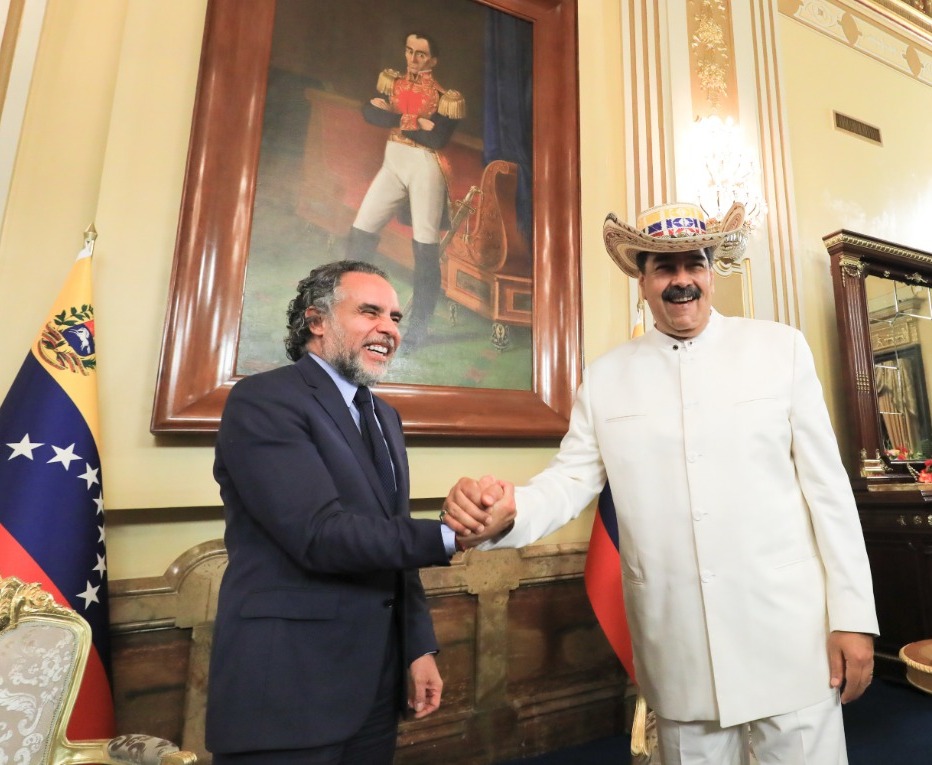 Left: Colombian President Gustavo
Petro greets
Venezuelan ambassador; right: Venezuelan President Nicolás
Maduro greets Colombian ambassador.
Left: Colombian President Gustavo
Petro greets
Venezuelan ambassador; right: Venezuelan President Nicolás
Maduro greets Colombian ambassador.
Another step that was swiftly taken by the new government was to pursue the full restoration of diplomatic and commercial relations with Venezuela, shut down definitively in 2019 as a result of repeated attempts by Duque, in connivance with his U.S. masters and violent sections of the Venezuelan opposition, to organize destabilization operations of all kinds in Venezuela aimed at overthrowing the government of President Nicolás Maduro. Today the governments of these historically linked sister countries have expressed a commitment to work together for the good of both countries and to benefit the people living on both sides of their 2,200-kilometre shared border. To that end they wasted no time in exchanging ambassadors and organizing a succession of ministerial-level and other working meetings that brought together officials, business and cultural groups and others from both countries.
On
September 13
President Gustavo Petro formally requested that Venezuela serve as a
guarantor along with Cuba and Norway for peace negotiations his
government will resume with the ELN, which Nicolas Maduro accepted.
Then on September 26 the border was officially reopened for commercial
and other vehicular traffic. It was marked with a joint ceremony and
celebrations on the Simon Bolivar International Bridge as the first
truckload of goods was driven from San Antonio on the Venezuelan side
to Cúcuta on the Colombian side, and vice versa.
Leadership Shakeup, New Doctrine for
Police and Military
A bold action Petro took within days of assuming the presidency was to replace the top leadership in the country's police and military forces, both of which fall under the jurisdiction of the Ministry of Defence. Many younger and lower-ranking officers were promoted to leading positions, resulting in the retirement of 28 generals and other high-ranking officers from the military and 26 from the police. A few reportedly decided to leave of their own accord but most were forced out, in particular any that Petro and his defence minister determined were implicated in human rights violations, abuse of power or corrupt acts.
Petro has called on members of the country's outsized forces of repression with a decades-long history of prosecuting a dirty internal war against the Colombian people to "be part of the profound transformations demanded by Colombians." He told them to prepare to become "an army of peace." Petro also announced that all police and military are from now on to be guided by a "human security" doctrine instead of the U.S.-inspired "national security" doctrine. In effect since the end of World War II, it places heavy emphasis on counterinsurgency and what Petro called "the false belief that there is an internal enemy in Colombia." The new doctrine calls for the military and police to engage in the care and protection of people in terms of preventing the massacres and targeted killing of social leaders and demobilized guerrillas who signed the Peace Agreement.
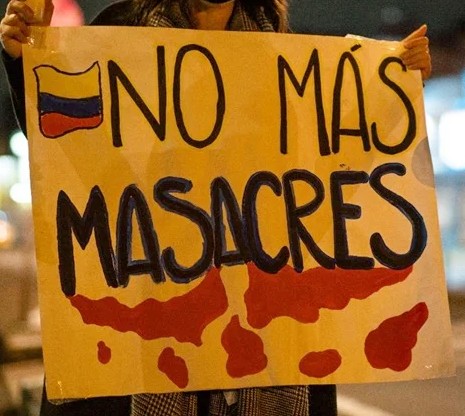 As of September
11, 126 social leaders and 34 demobilized FARC members were reported to
have been assassinated so far in 2022 and 77 massacres registered
(three or more people murdered in one killing event) according to the
non-governmental organization INDEPAZ. The numbers, which increase
almost on a daily basis, are significantly higher than for the last two
years. Since the signing of the Peace Agreement in 2016, 340 of its
signatories have been assassinated, most with impunity. Petro has told
the military and police that security must no longer be measured by
their count of “kills” or casualties, but by a
decrease in lives lost and the betterment of people's living conditions.
As of September
11, 126 social leaders and 34 demobilized FARC members were reported to
have been assassinated so far in 2022 and 77 massacres registered
(three or more people murdered in one killing event) according to the
non-governmental organization INDEPAZ. The numbers, which increase
almost on a daily basis, are significantly higher than for the last two
years. Since the signing of the Peace Agreement in 2016, 340 of its
signatories have been assassinated, most with impunity. Petro has told
the military and police that security must no longer be measured by
their count of “kills” or casualties, but by a
decrease in lives lost and the betterment of people's living conditions.
Related to this, the minister of defence has ordered the
suspension of aerial bombardments in areas where minors or civilians
could be present. According to the president of the Colombian Senate's
Peace Commission, Senator Ivan Cepeda, during Ivan Duque's government
(2018-2022) there were 30 bombings in which 29 minors were killed who
were not part of the "illegal structures" that were targeted.
Emergency Protection Plan for Social
Leaders, Former Guerrillas
Another initiative undertaken by the government is an
emergency plan aimed at protecting the lives of social leaders, rights
defenders and former members of the FARC guerrilla organization through
setting up what are called Unified Command Posts for Life in 65
communities around the country. The posts, which have representation
from both civilian and military institutions from the national to the
local level, and from the local communities, are to emphasize
prevention, including through taking immediate action whenever early
warnings are issued by the Ombudsman's Office.
Peace as Official Policy of the State
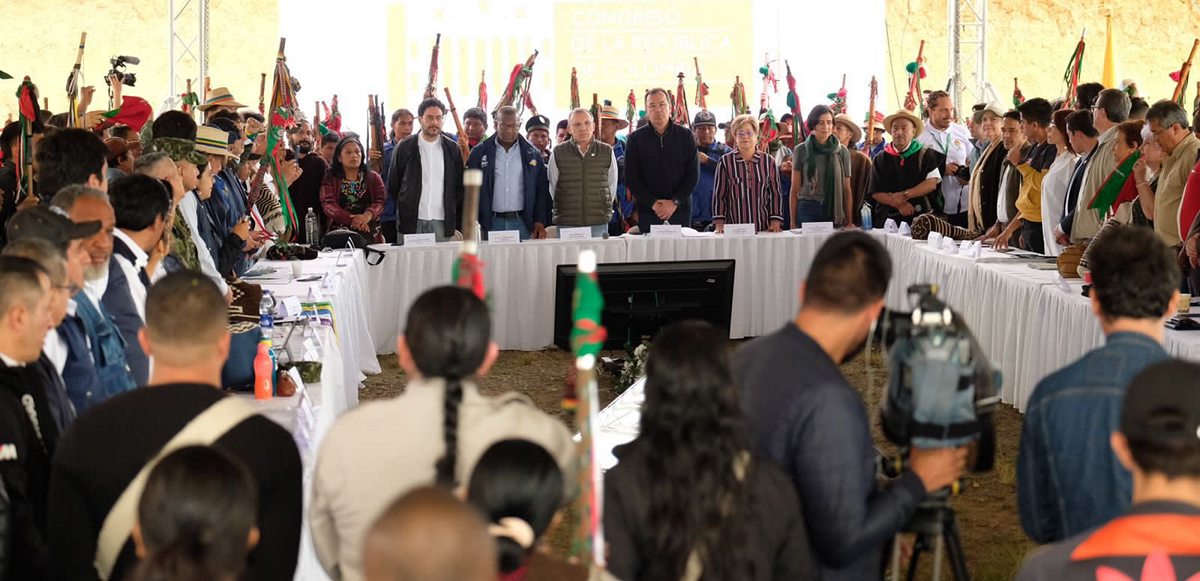 New
government launches the first Unified Command Post for Life in the
Cauca region, August 20, 2022. The initiative is to protect
the people facing violence across the country, especially social
leaders, human rights activists, environmentalists and former FARC
fighters.
New
government launches the first Unified Command Post for Life in the
Cauca region, August 20, 2022. The initiative is to protect
the people facing violence across the country, especially social
leaders, human rights activists, environmentalists and former FARC
fighters.
Reflecting President Gustavo Petro's stated aspiration to resolve all internal conflicts in the country of both a political-military and straight criminal-mercenary nature in order to achieve lasting or "total peace," a bill titled "The State Policy of Peace" was introduced in the National Congress on August 30. The policy would be applicable to all branches of government. It would also make any peace agreements negotiated by a government binding on successor governments so they cannot decide to "tear them to shreds" or refuse to implement them, as Duque made the mission of his government with respect to the agreement signed with the FARC by his predecessor Juan Manuel Santos.
Among other things the legislation calls for doing away with compulsory military service for youth, offering them the alternative of performing a year of paid social service for peace. This includes work with victims of the war, helping implement peace agreements, or programs to protect the environment or to teach computer/internet literacy.
The bold first steps taken and changes
announced by the new government, while creating high expectations and
enjoying the support and active collaboration of many Colombians, are
already coming up against the opposition of those forces whose
interests do not lie with a genuine and lasting peace or with the
social and environmental justice that are also banners of the new
government. It cannot be forgotten that there are seven U.S. bases on
Colombian territory (two naval, three air force, two army) and an
unknown number of U.S. troops, intelligence operatives and
"contractors"/mercenaries of different kinds engaged in both covert
operations and joint training exercises with Colombian special forces
and other troops all very much shaped in the U.S. image. As well,
Colombia is a "strategic partner" of the U.S. and a NATO "global
partner" -- the only country with those
designations in all of Latin America and the Caribbean.
There has been no indication so far that any of these arrangements
which serve to bind Colombia to the U.S. war machine are slated to
change under the new government. It is difficult to imagine how total
peace can be achieved -- inside Colombia or in its relations with other
countries -- without addressing the nature of its relationship with the
U.S. and NATO. That is where the fight of the organized people will be
decisive -- for the kind of peace they consider acceptable and that
ensures Colombia's contribution to making Latin America and the
Caribbean a zone of peace.
(Photos: Cuban President Diaz-Canel, Telesur, Resumen Latino Americano)
Japan
Assassination of Former Prime Minister Abe Shinzo
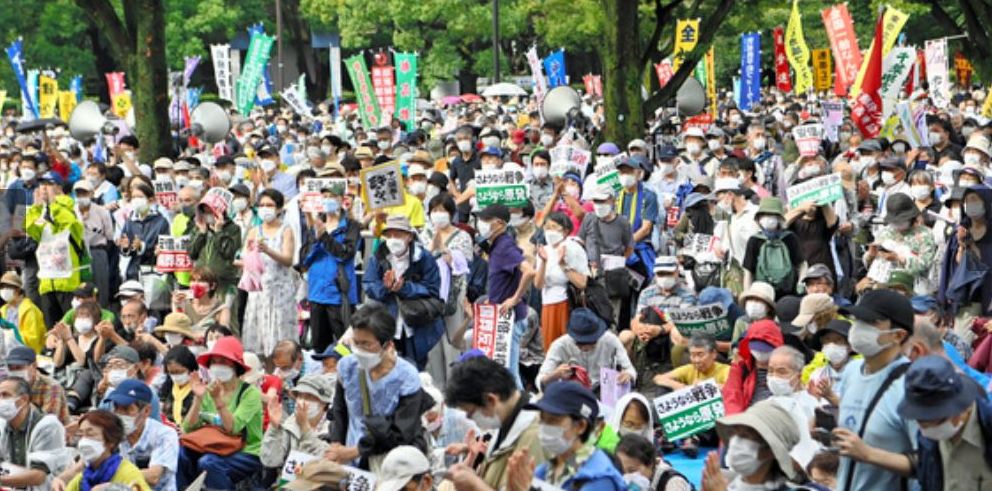
Protest against holding a
state funeral for Abe Shinzo, September 19, 2022
The young assassin of former Japanese Prime Minister Abe Shinzo said he was driven to do so by the close association of Abe and his ruling Liberal Democratic Party (LDP) with the religious sect known as the Family Federation for World Peace and Unification, formerly known as the Unification Church for World Christianity or Moonies. The assassin said the church extorted from his vulnerable mother the family's business and wealth after the death of his father. The Unification church has been successfully prosecuted on numerous occasions for extorting money from followers using a wide range of consumer crimes such as "spiritual sales" of exorbitantly priced goods.
The Moonies have become a cause celebre in Japan since the assassination of Abe on July 7. The LDP ruling cartel party itself poured fuel on the flames with the announcement that a state funeral for Abe will be held, which will cost millions of dollars, and demanding the entire nation observe a minute of silence. Abe himself is widely unpopular for introducing harsh anti-social measures during his tenure and using state resources and influence to line the pockets of his family and other privileged private interests. He also became a darling of the U.S. imperialists as a global mouthpiece for resurgent Japanese militarism and the desire of the ruling elite to use the Japanese military abroad either within or in support of U.S./NATO aggression in violation of Article Nine of Japan's post-war constitution, which Abe wanted to remove.
Under pressure, the ruling LDP cartel party has revealed that most of its cabinet members and half its Diet (Parliament) members have close relations with the Moonies. The relationship goes both ways with members from the groups actively participating in each others' activities and exchanging funds and doing their wishes.
A key joint activity since 1967 has been active participation in Japan, south Korea and elsewhere in the Moonies' International Federation for Victory over Communism. The backdrop or political means for this participation is the continuing U.S. military occupation of Japan and Korea following WWII and the global political/military campaign to "contain communism."
The U.S. imperialists used their post-war police powers in Japan to fashion Westminster-style liberal democratic institutions, including a fictitious person of state in the hereditary Shinto Emperor, as a political front to maintain control and bring former members of the Japanese military government and elite back into power. The Abe ruling militarist family became an important weapon for the U.S. occupation to maintain control and suppress the post-war anti-militarist movement for the people's right to be in control of all affairs that affect their lives within modern democratic political forms and institutions rather than be subjects of an economic and political elite dictating the affairs of all and sundry.
Abe family members were active in the war-time military government and after. In 1957 Abe Shinzo's grandfather Kishi Nobusuke became Prime Minister. Abe's younger brother Kishi Nobuo is the current Defence Minister and other family members have held and currently hold important economic and political positions.[1] Along with others in the ruling elite, they are active in the LDP, other cartel parties, Moonies and the International Federation for Victory over Communism. The Japanese newspaper Akahata reports, "Since 2014 alone, interviews and speeches of more than 80 LDP national and local legislators have appeared in the media affiliated with the ‘International Federation for Victory over Communism,' an integral group of the Moonies." During the sixties the Moonies became entrenched in Japanese cartel party politics, especially with the LDP, using their members to finance and campaign in elections.
Following the war, the Japanese ruling elite formed a political force to further the U.S.-led global campaign for the "containment of communism." The political aspect of the "containment" of the people's striving for the New is the liberal democratic cartel party system and its control of Japan's political affairs. The military side was the U.S. military occupation of Japan and south Korea, which continues today alongside the rapid growth of the Japanese military.
Together, the political and military aspects launch continuous provocations and threats against the DPRK, China and all others in the Indo-Pacific region who may dare to break away from U.S. hegemony. The military side was revealed soon after the war with Japan's active support of U.S. aggression against Korea during the Korean War and again as a staging ground and supplier to the U.S. military during its war of aggression in Vietnam. It continues today by allowing scores of U.S. military bases and naval ports on Japanese territory to intimidate the people and threaten its neighbours.
In the context of the U.S. fight to maintain its global hegemony, the LDP and other militarists want to shed all restraints and participate fully in U.S./NATO military activities worldwide. For this, they seek to wreck any anti-war public opinion and features of it in public life, such as Article Nine in the post-war Japanese constitution which prohibits the Japanese military from threatening or engaging in wars abroad. Former prime minister Abe was the foremost spokesperson for this militarist activity along with the anti-social offensive and for doing so is revered by the U.S. imperialists and their allies.
Opposition to a State Funeral for Abe
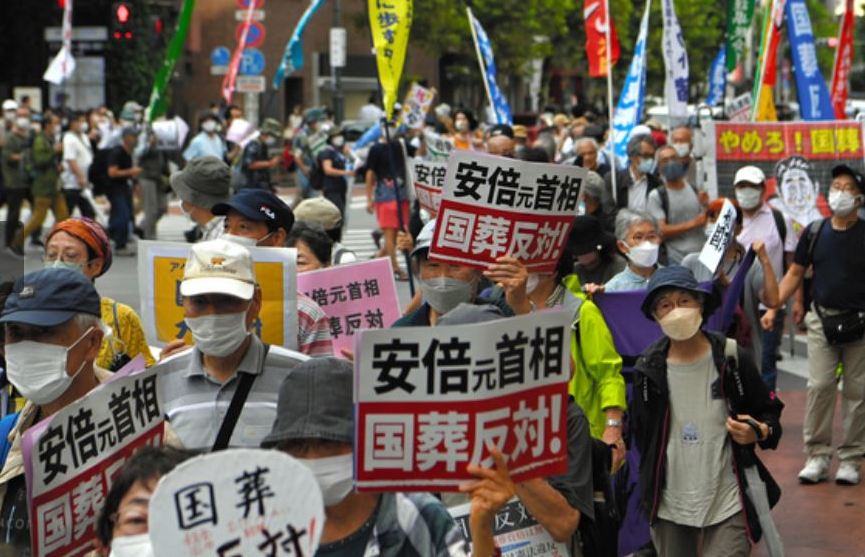
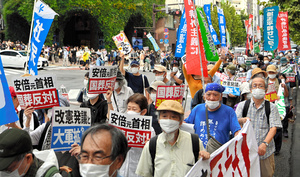 Protest against
holding a state funeral for Abe Shinzo, September 19, 2022
Protest against
holding a state funeral for Abe Shinzo, September 19, 2022
Earlier, 60 religious figures from all the major religions in Japan submitted to the Cabinet Office a joint statement demanding it withdraw the decision to hold a state funeral for Abe Shinzo on the grounds that the state authority does not have the right or authority to impose on the general public a need to express condolences over Abe's death.
Demonstrations opposing the state funeral are occurring throughout Japan such as the large one in Tokyo on September 19, with thousands of participants.
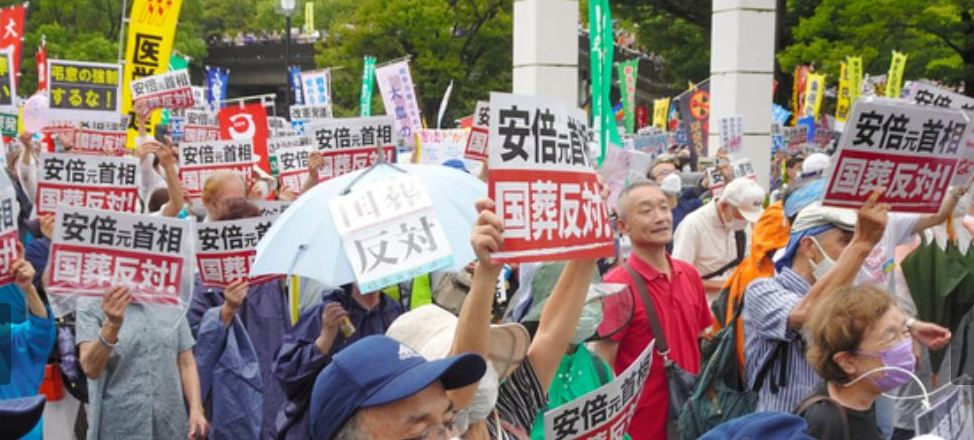
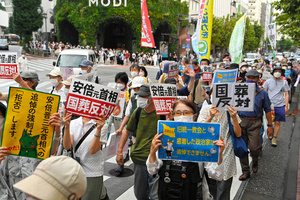
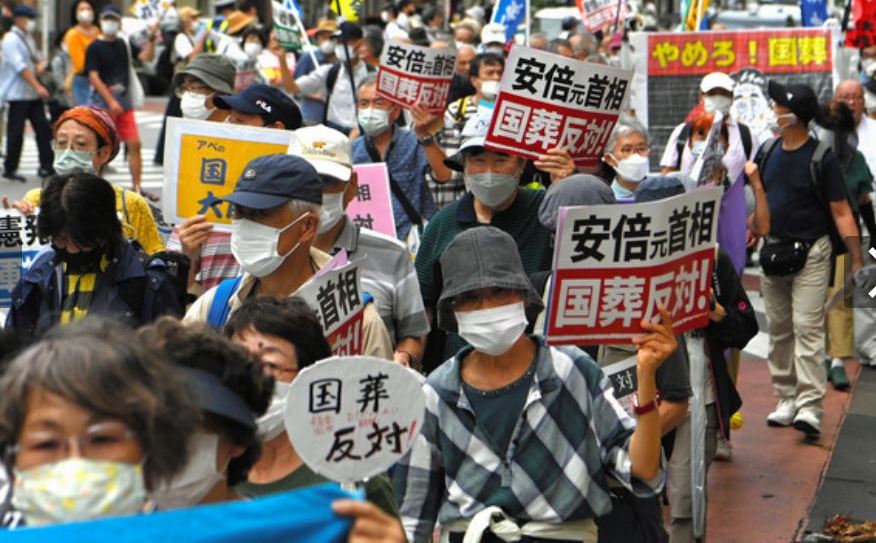
Notes
1. Known for his exploitative rule as economic manager of the Japanese puppet state of Manchukuo in Northeast China in the 1930s, Abe's grandfather Kishi was nicknamed the "Monster of the Sh wa era" (Sh wa no y kai). Kishi later served in the wartime cabinet of Prime Minister Hideki Tojo as Minister of Commerce and Vice Minister of Munitions, and co-signed the declaration of war against the United States on December 7, 1941.
After World War II, Kishi was imprisoned for three years as a suspected Class A war criminal. However, the U.S. government did not charge, try, or convict him, and eventually released him as they considered Kishi to be the best man to lead a post-war Japan in a pro-American direction. With U.S. support, he went on to consolidate the Japanese conservative camp against perceived threats from the Japan Socialist Party in the 1950s. Kishi was instrumental in the formation of the powerful Liberal Democratic Party (LDP) through a merger of smaller conservative parties in 1955, and thus is credited with being a key player in the initiation of the "1955 System," the extended period during which the LDP was the overwhelmingly dominant political party in Japan. Kishi backed numerous organizations of far-right-wing causes including Korea's Unification Church (Toitsu Kyokai), the Asian People's Anti Communist League, the Moral Re-Armament Movement, and served as an adviser for the association of war veterans (Nihon Goyu Renmei) and of the national fascists (Sokoku-boei Doshi-kai). His younger brother, Eisaku Sat, also became prime minister from 1964 to 1972 and received the Nobel Peace Prize as a co-recipient in 1974 [for his service to U.S. imperialism — TML Ed Note]. Kishi was the maternal grandfather of Shinzo Abe, who twice became prime minister, and current defense minister Nobuo Kishi. His older brother, Ichir Sat , was a Vice Admiral in the Imperial Japanese Navy during the war. (From Wikipedia)
2. The public approval rating of the Cabinet of Prime Minister Fumio Kishida has plummeted to 29 percent, dropping below 30 percent into a "danger zone," according to a September 18 poll by Japanese newspaper Mainichi Shimbun. This represents a fall of seven percentage points since the previous survey in August.
The approval rating of Japan's main ruling Liberal Democratic Party (LDP) also dropped six percentage points from the previous poll to 23 per cent.
The newspaper says the sharp drop in the approval ratings for the Cabinet and the LDP is blamed partly on their links to the Unification Church and plans for a state funeral for Abe. Only 12 per cent of respondents said they "approve of" Kishida's response to the issue of Japanese politicians' ties to the Unification Church, far less than the 72 per cent who said they did not approve. As for a state funeral for former Prime Minister Shinzo Abe, 62 per cent oppose it, up 9 percentage points from the previous survey, while only 27 per cent were in favour.
(Photos: Asahi-Shimbun)
Anniversary of Vietnam's Independence
Long Live the Socialist Republic of Vietnam!
 Vietnam's President Nguyen Xuan
Phuc chairs a celebration of his country's National Day in Hanoi,
Vietnam's President Nguyen Xuan
Phuc chairs a celebration of his country's National Day in Hanoi,
August
31, 2022
On September 2, 1945, the historic August Revolution of the Vietnamese people was successfully concluded and Vietnam emerged a sovereign independent country putting an end to a 1,000-year history of Chinese rule and close to 100 years of French colonial oppression and Japanese fascist occupation.
On that date, President Ho Chi Minh issued Vietnam's Declaration of Independence in Ba Dinh Square, Hanoi. Before a jubilant assembly of close to one million of his compatriots, he declared, "We, members of the Provisional Government of the Democratic Republic of Vietnam, solemnly declare to the world that Vietnam has the right to be a free and independent country -- and in fact is so already. The entire Vietnamese people are determined to mobilize all their physical and mental strength, to sacrifice their lives and property in order to safeguard their independence and liberty."
 President Ho Chi Minh issues
Vietnam's Declaration of Independence, Ba Dinh Square, Hanoi,
President Ho Chi Minh issues
Vietnam's Declaration of Independence, Ba Dinh Square, Hanoi,
September
2, 1945.
National Day is ardently celebrated by close to 100 million Vietnamese in their homeland, the patriotic diaspora and friends of Vietnam worldwide. It is an occasion when Vietnamese people take stock of their achievements under the leadership of the Communist Party of Vietnam.
It was in this spirit that Vietnam's President Nguyen Xuan Phuc and his spouse chaired a ceremony in celebration of Vietnam's National Day at the International Convention Centre in Hanoi on August 31, attended by foreign diplomats and heads of international organizations.
Speaking at the event, President Phuc pointed out that since declaring its independence, Vietnam has surmounted countless difficulties and challenges to firmly maintain independence, reunify the country, and obtain many proud development achievements.
In his remarks, President Phuc highlighted Vietnam's achievements in foreign relations. It has diplomatic ties with 190 countries and played an important role in various international fora and meetings in recent years. For example, Vietnam successfully hosted the Asia-Pacific Economic Cooperation (APEC) meetings throughout 2017, the Democratic People's Republic of Korea-United States Summit in 2019, chairing the Association of Southeast Asian Nations (ASEAN) in 2020, and serving as a non-permanent member of the UN Security Council for 2020-2021. It was recently elected to the UNESCO Executive Board for 2021-2025 and re-elected to the International Law Commission.
President Phuc expressed appreciation for the precious support and effective cooperation from countries, international organizations and partners, businesses, investors, friends, and people around the world for Vietnam, especially in the fight against the COVID-19 pandemic.
He used his remarks on National Day to call on other countries to expand cooperation with Vietnam to help achieve fast and sustainable development. The President suggested four cooperation priorities: sustaining peace and stability, respecting international law and the UN Charter, maintaining a favourable international environment for economic recovery cooperation; continuing to substantively promote cooperative ties, with a focus on developing infrastructure, ensuring sustainable supply chains, and effectively implementing the agreements on digital transformation, green economy, human resources, and science-technology; enhancing partnerships in climate change response, epidemic prevention and control, health care capacity and social security improvement, and wealth gap and social inequality narrowing; and increasing forms of connectivity, all-level mutual visits, exchanges of business delegations, and people-to-people exchange.
On the anniversary of Vietnam's hard-won independence, the Communist Party of Canada (Marxist-Leninist) extended its warmest revolutionary greetings to the Communist Party of Vietnam, the government of the Socialist Republic of Vietnam and the Vietnamese people everywhere.
Long Live the Socialist Republic of Vietnam!
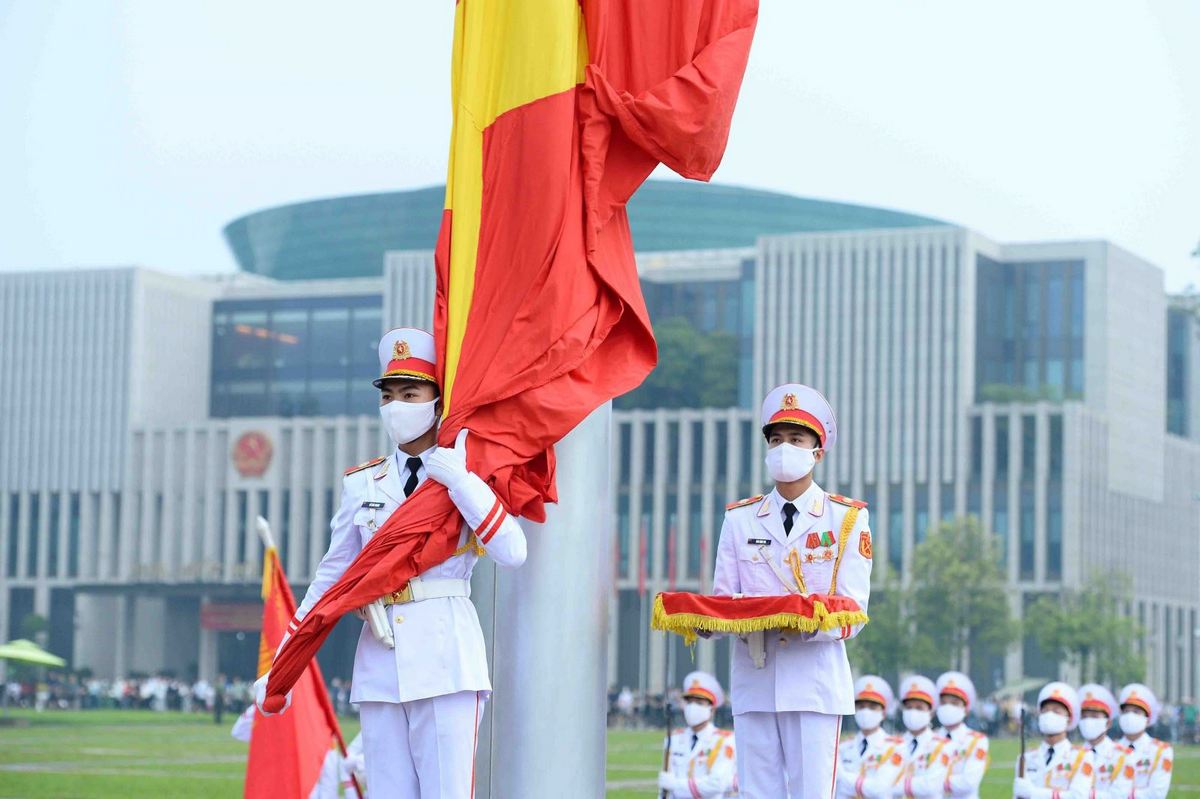
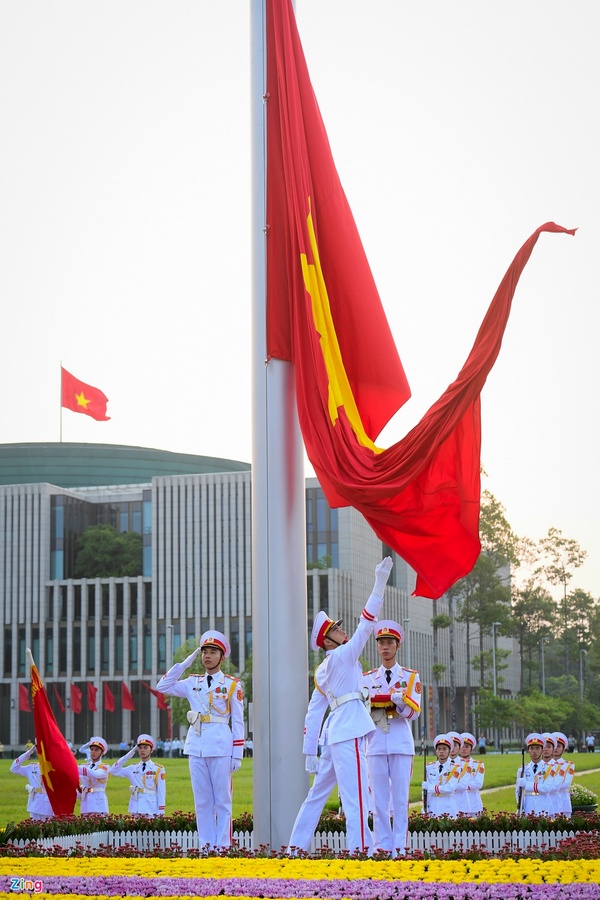 Flag raising in
Hanoi on the occasion of National Day.
Flag raising in
Hanoi on the occasion of National Day.
 Party and state leaders mark
National Day with a visit to the Mausoleum to pay tribute to
Party and state leaders mark
National Day with a visit to the Mausoleum to pay tribute to
President
Ho Chi Minh.
Canada-Vietnam Friendship Society Marks Vietnam's August 19 Revolution and National Day
A lively and informative webinar hosted by the Canada-Vietnam Friendship Society was held August 19 to commemorate the 77th anniversary of the August Revolution in Vietnam. The event was attended by participants from across Canada, the U.S. and Britain.
The online event was moderated by Sophia Leong of the York University Centre for Asian Research. The keynote presentation was given by His Excellency Pham Cao Phong, the Ambassador of the Socialist Republic of Vietnam to Canada. Ambassador Pham highlighted the significance of the August 19th Revolution, led by President Ho Chi Minh and the Communist Party of Vietnam, in setting the stage for the nation building project expressed in today's Vietnam. He proudly pointed out that the August 19 Revolution launched the first workers' and peasants' state in Asia.
Ambassador Pham noted that the patriotism, fighting spirit and determination of the Vietnamese people in defeating the French occupiers and U.S. aggressors is manifest today in Vietnam's role in promoting peace, equality and friendly relations and development worldwide. He highlighted that in recent years Vietnam has achieved and even exceeded many of its economic and social development goals as a result of the stimulus of the Doi Moi reforms adopted by the government of Vietnam in 1986. These reforms have enabled Vietnam not only to achieve robust growth in its domestic economy, but also raised the profile of Vietnam internationally. Ambassador Pham expressed confidence that 2023, which marks the 50th anniversary of Canada-Vietnam diplomatic relations, will be an opportunity to further strengthen the positive ties between the two countries and peoples.
Speaking on behalf of the Canada-Vietnam Friendship Society, Philip Fernandez pointed out that the close fraternal relations between the Vietnamese and Canadian people were forged during the broad opposition in Canada to the U.S. war of aggression in Vietnam. He noted that hundreds of thousands of people including students and youth stood with the people of Vietnam and Ho Chi Minh. Canadians fiercely resisted the government of the day's integration of Canada into the U.S. war machine, supplying the U.S. military with napalm, explosives, planes, missiles, bullets and other equipment made in Canada to be used against the Vietnamese people. Also noted was the people's opposition to Canadian NGOs and others agencies working in Vietnam providing intelligence to the U.S. military. In February 1967, the Vietnamese government sent a formal note of protest to Ottawa denouncing these activities.
Fernandez also noted that Canadians not only greatly appreciate the historic contributions made by Ho Chi Minh and the Vietnamese people to the annals of the anti-colonial, anti-imperialist struggle, but also Vietnam's principled defence of peace and the non-use of force to settle conflicts between peoples and nations today. As well, they appreciate greatly Vietnam's efforts to uphold the principles of equality, mutual respect, self-determination and independence. In today's complex world where the U.S., NATO and its allies have triggered a war in Ukraine and are provoking China, Vietnam's stand in defence of principle, rule of law and peaceful resolution of differences is a vital contribution to all nations and peoples striving for their right to be and to live in peace.
Dr. Joe Pateman from the Department of Politics, University of Sheffield, outlined the significance of the August 19 Revolution by pointing out that Ho Chi Minh and the Communist Party of Vietnam seized an historical moment to take control of their future. He highlighted that despite being ill-quipped and having small forces, the Viet Minh guerillas were able to defeat superior military forces with strategy and tactics worked out by which to mobilize the entire people, isolate and divide the enemy and consolidate political power step-by-step.
A lively question period followed the formal presentations in which Ambassador Pham was able to field a number of questions and elaborate on the points he had made earlier.
Towards the end of the event, Vietnam's Consul General in Vancouver, Mr. Nguyen Quan Trung said a few words about the work he is doing to promote relations between Canada and Vietnam and expressed his deep appreciation for the friendship and support of the Canadian people for Vietnam and the Vietnamese people.
As part of concluding remarks, Philip Fernandez expressed congratulations and best wishes to the fraternal Vietnamese people on the historic occasion of the August 19th Revolution and the 77th anniversary of Vietnam's National Day marked on September 2, the day President Ho Chi Minh declared Vietnam's independence at Bai Dinh Square in Hanoi.
India
Farmers Across the Country Continue
Protests and
Agitation
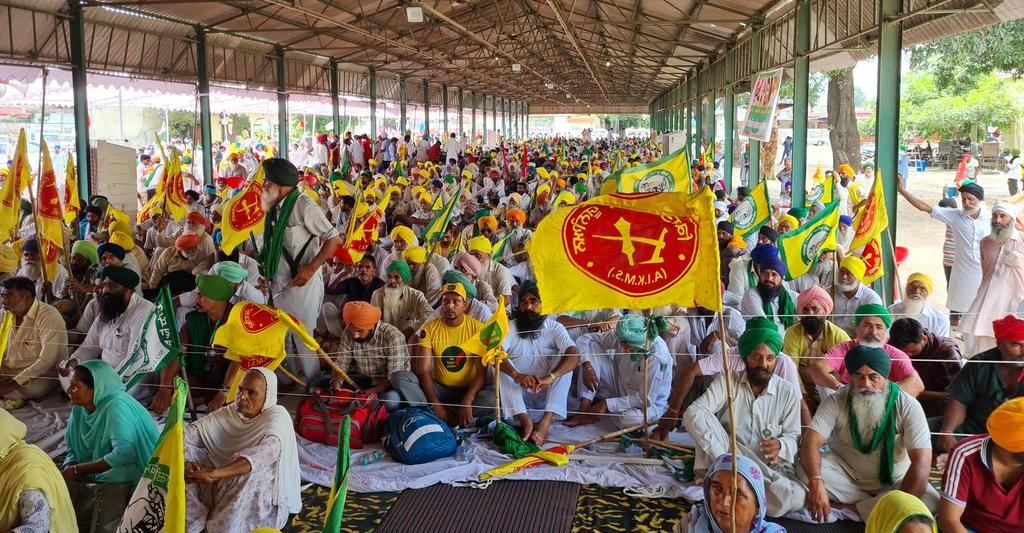
Lakhimpur Kheri, farmers Mahapanchayat, August 19-20, 2022
Farmers across India are continuing their protests and agitation. They are strengthening their unity by raising awareness among people and by organizing in every village of India. They are holding Kisan Panchayats (farmers' meetings) and Mahapanchayats (mass meetings) to discuss basic problems of farmers, workers, women, Dalits and the toilers and oppressed people. In Lakhimpur Kheri hundreds of thousands of farmers held a Mahapanchayat and denounced the government and its policies as well as attacks on the farmers and people, especially against Muslims and Dalits. They condemned the arrest of Teesta Setalvad and other human rights activists. The Mahapanchayat announced a plan of action for the coming months across India which continues the ongoing agitations.
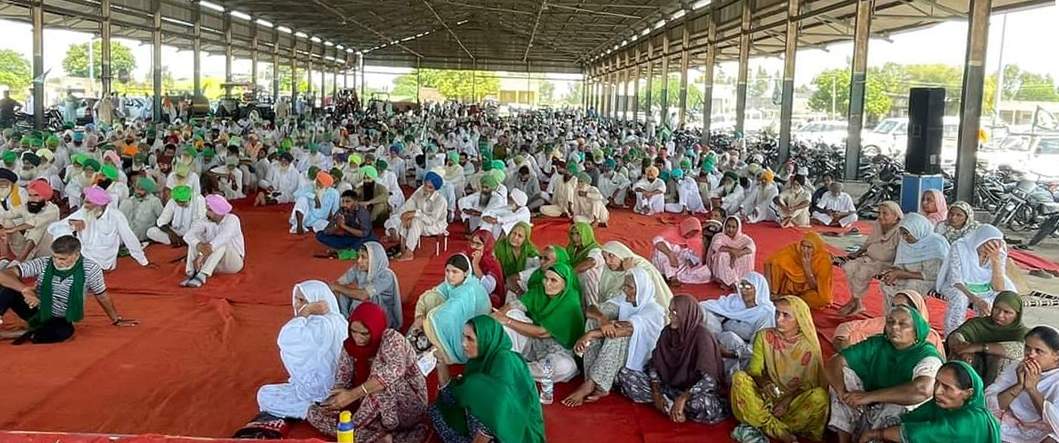 Faridkot, Punjab
Mahapanchayat,
August 14, 2022
Faridkot, Punjab
Mahapanchayat,
August 14, 2022
Massive protests were held by apple growers in Himachal Pradesh jointly with farmers, against their loot by Adani. To counter attacks on Muslims, farmers are building defence committees, harmony committees and peace committees.
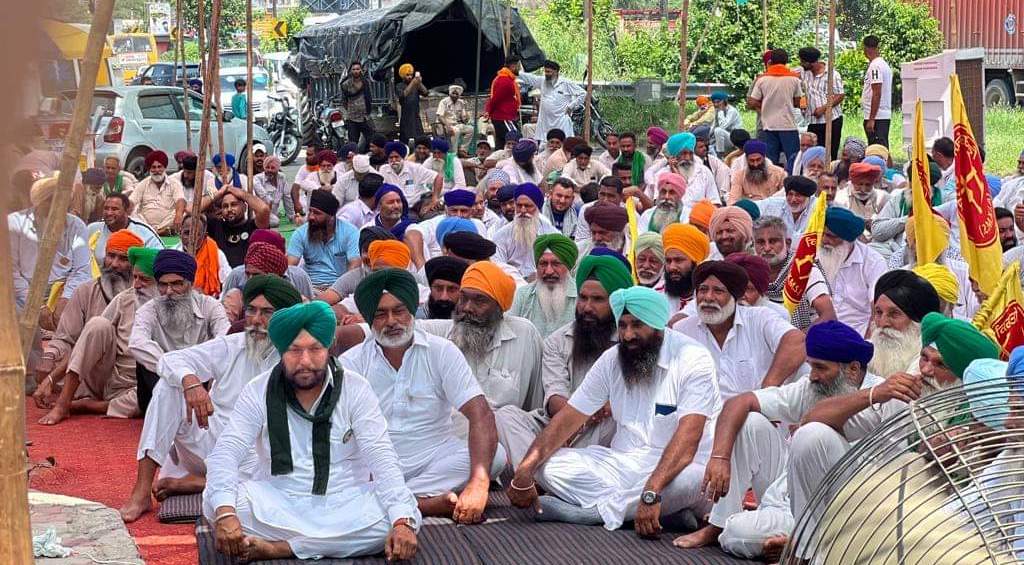 Protest
by sugar cane farmers in Phagwara, Punjab demanding payment for their
cane, August 10, 2022.
Protest
by sugar cane farmers in Phagwara, Punjab demanding payment for their
cane, August 10, 2022.
Samyukta
Kisan Morcha (SKM) leaders opposed the government meeting of the
committee on Minimum Support Price (MSP). They called the panel a
"farce" and said nothing conclusive will come out of the talks. They
convoked a national meeting of the SKM on September 6 in Delhi to chalk
out future plans.
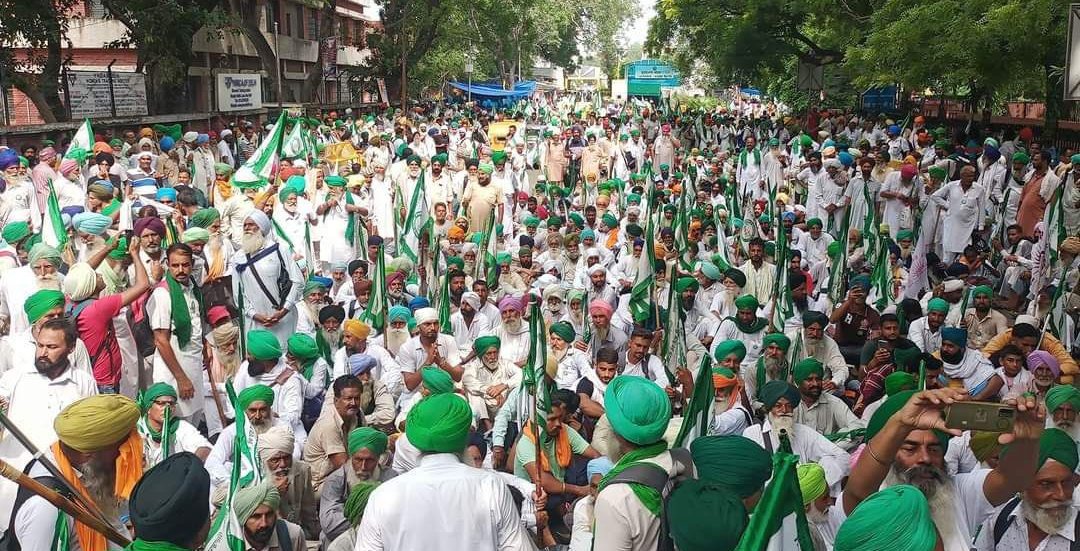
 Farmers
arrive in Delhi for August 22, 2022 Mahapanchayat.
Farmers
arrive in Delhi for August 22, 2022 Mahapanchayat.
The farmers held a Mahapanchayat
in Delhi on August 22, in spite of government attempts to stop them.
Many of their leaders were held at border points into Delhi but the
farmers broke through the barricades and went to Jantar Mantar in the
heart of the city. They protested the Modi government's "betrayal" on
MSP and demanded the release of farmers held during the Morchas,
the sacking of Ajay Mishra from the Cabinet, the release of political
prisoners, and a livelihood for the youth, amongst other things.
Jantar Mantar resounded with slogans such as Tanashahi
Nahin Chalegi (Down with Dictatorship), Hindu
Muslim Nahin Chalega (Inciting Divisions on the Basis of
Religion Will Not Work), Awaz Do Hum Ek Hain (We
are United as One), Muslim Pe Humla Sabhi Pe Humla
(Attacks on Muslims Are Attacks on All), Dharti Mata Ki Jai
(Long Live Mother Earth), Jai Kisan, Jai Jawan
(Long Live Farmers and Soldiers), Adani, Ambani Murdabad
(Down with Adani and Ambani), Zuban Pe Tala Murdabad
(Down with the Criminalization of Dissent -- "lock on tongue").
A young woman farmer sang the following song expressing the sentiments of the Mahapanchayat:
Dilli
Di Hakumate, Lokan Di Ni Bairne
Lok Hard Lai Jayuga Baha
(Delhi government enemy of the people,
The flood of
the people will sweep you away)
Speaker after
speaker denounced the Modi government and the repression it has
unleashed on all those who are fighting for their rights. One of the
speakers called on the administration to let the buses full of farmers
get into Delhi, otherwise they will continue sitting at the Jantar
Mantar.
Farmers are raising all the problems of
society -- land theft, state terror, communal violence, caste
oppression, the corruption of the political process, the exploitation
and oppression inherent to the economic system, etc. They have a wide
variety of opinions but they have taken a firm stand against
sectarianism -- against dividing their ranks on the basis of opinions
and beliefs. They have consciously adopted the position of being United
in Action to Fight for the Rights of All.
Farmers' organizations in Punjab and Haryana also organized a protest
in Chandigarh to denounce the Gujarat government decision to release
the rapists of Bilkis Bano, who was gang raped. Thousands of farmers,
youth, students, women and also workers gathered in spite of the
government trying to block them.
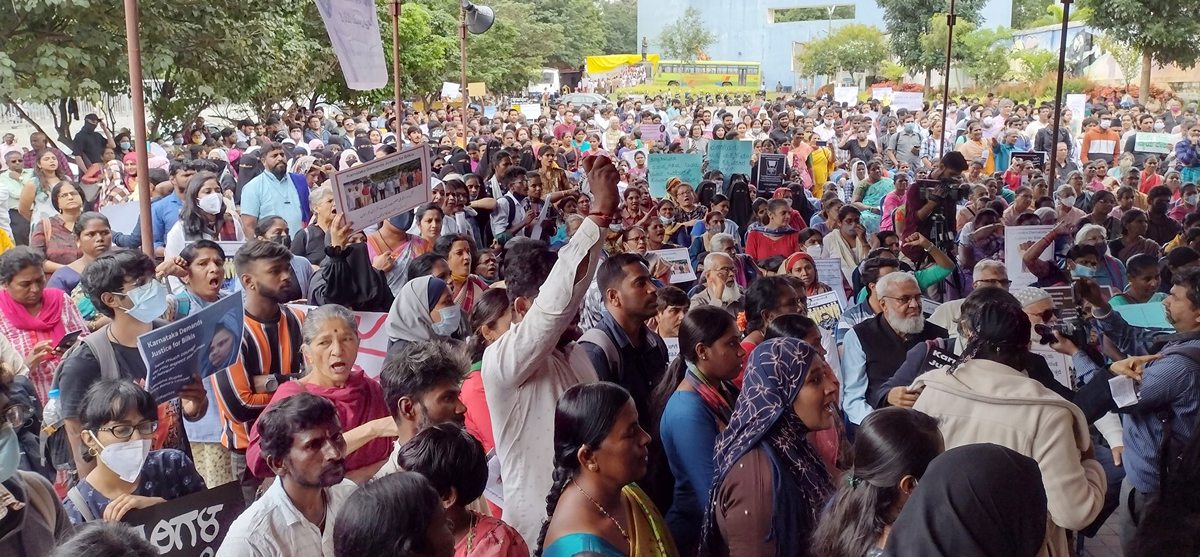
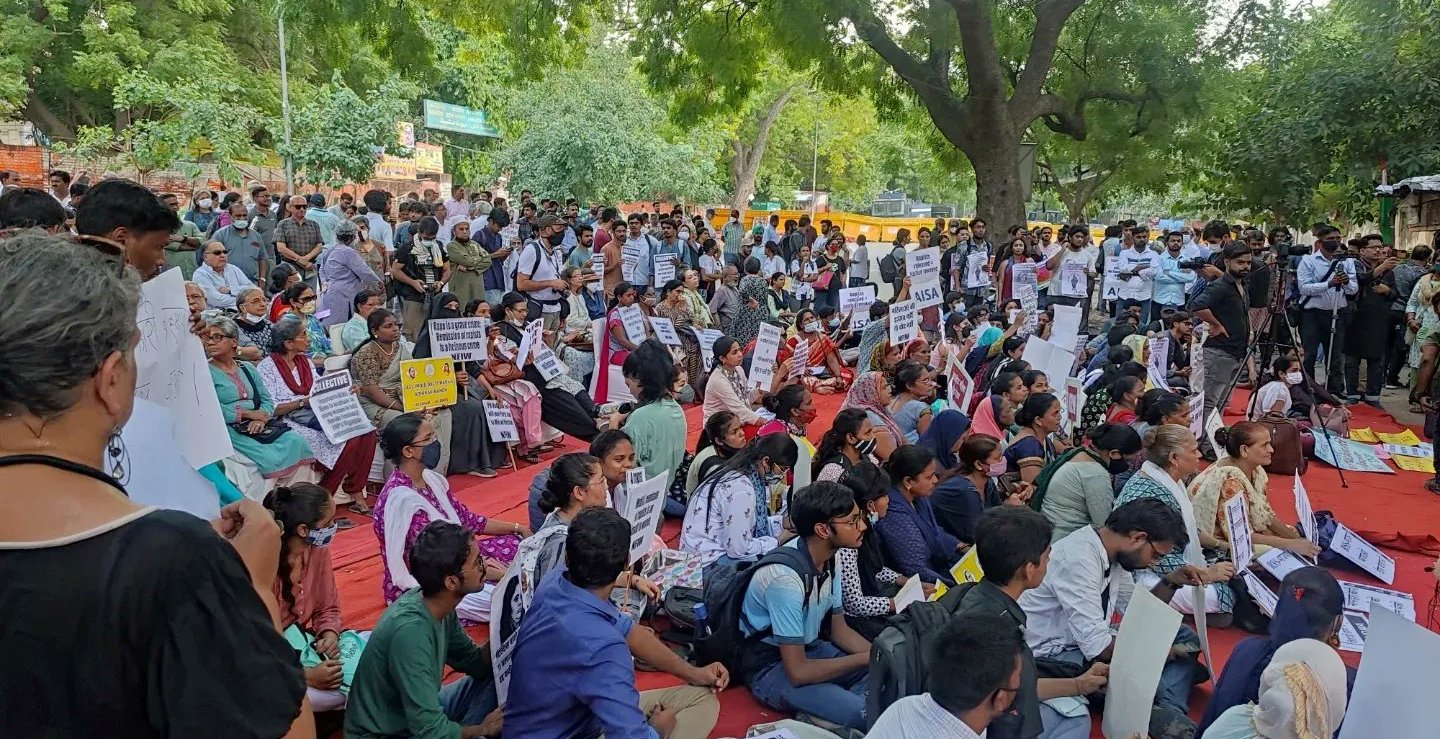
Protests in Karnataka and Delhi
on August 27, 2022 against the release of Bilkis Bano's rapists.
Politicians continue to make false promises. Punjab chief
minister Bhagwant Mann has announced that they will make Punjab "Cancer
Free." One commentator said with a smile that the minister thinks he is
still doing comedy, because he has no idea what he is talking about.
Like other parties, the Aam Admi Party in Punjab is making one
declaration after another without even feeling the need to know what
they are saying. Similarly, the Aam Admi Party in Gujarat is claiming
that it will end unemployment in Gujarat in five years.
Lies are flying left, right and centre as state and general elections
approach. In this way, falsification and fraud have become the essence
of liberal democracy -- make any promise to keep the people divided and
diverted from uniting in action to fight for their own aims. Their
intention is revealed by their inability to fulfill whatever they say.
They know that they don't have to be accountable to the voters and
people as they do not represent them, but that they do to the narrow
private interests which control the decision-making power.
All over the world slogans and demands are being raised which recognize
the need to affirm the Right to Be of all people and end the anti-human
and anti-nature economic and political system. The Necessity for Change
requires that the way be opened for renewal and the renovation of
everything on the basis of activating the human factor/social
consciousness. This is achieved by implementing the mass democratic
method of participating in setting the agenda for our actions ourselves
and not permitting the sectarian spirit to infect the movement.
India's Prime Minister Modi, like his predecessors, Manmohan
Singh, Indira Gandhi, Nehru and others before him, gave rise to a lot
of hot air from the Red Fort on August 15. As usual he has
conveniently forgotten his older promises of Har Ghar Jal
-- the scheme initiated by the Government of India in 2019 which
claimed to have the aim to provide tap water to every rural household
by 2024. He has now moved on, uttering five new phrases: a
"developed India by 2047, removing any sign of servility, [having]
pride in heritage, unity, and fulfilling our duties."
A commentator said that Modi didn't seem that confident this year,
maybe his guilty conscience was pricking him that he is lying again in
front of the whole world. Such people do not have a care as to what
they are saying even means. Modi is in good company and continuing the
tradition of deception and fraud. Garibi Hatao Desh Bachao
(Remove poverty, rescue the country) was the theme and slogan of Indira
Gandhi's 1971 election campaign. Garibi Hatao,
Socialism, Secularism, Shining India, Incredible India, and many more
calls have been given by India's ruling elites even before the current
age when the factional fights to seize hold of the executive powers are
sharper than ever.
Several opposition parties
including Congress passed a resolution in the second week of August to
root out the influence of "Machine, Media and Money" in elections.
Since 1947, Congress has used all three Ms to come to power. It's a
cartel party system in the service of the interests of the Tatas,
Birlas and other monopoly houses. For the big private interests,
financing a cartel party is a small investment for them to access the
treasury on a permanent basis. For example, the Indian government has
forgiven the loans of a handful of monopolies to the tune of $145
billion.
No matter which party has been in power,
elections are a resource transfer mechanism by the rich. They pay the
parties to fight elections so that the state is privatized directly.
They replace civil service organizations with their own private
consulting firms and companies through which they have direct access to
the resources of the country. In the process, cartel party leaders
enrich themselves and accrue privilege. The system works no matter
which party comes to power.
Now when the most
powerful section of the ruling elite has decided to make BJP their
standard bearer as they think that it will better serve their
interests, Congress is talking about the use of Machine, Media and
Money (3M). CPI(M) was in power in Bengal for 30 years and it used the
same 3M template. They used every trick in the book that Congress had
used in the service of the ruling elite, including killing thousands of
youth. The Aam Admi party is using the 3Ms in Punjab, while at the same
time giving rise to a lot of rhetoric against it. What they say and
what they do are two different things.
It reveals
that liberal democracy cannot exist without the 3Ms. The U.S. is the
greatest example of it. The great American writer Mark Twain figured it
out a long time ago. "We have the best government that money can buy,"
he famously said. The Congress Party in India is missing its "lost
paradise." It is trying to get back into power thinking it can make
people forget their history.
(Photos: tractr2twitr, M. Punia, S. Villi, A. Petsra)
(To access articles individually click on the black headline.)
Website: www.cpcml.ca Email: editor@cpcml.ca



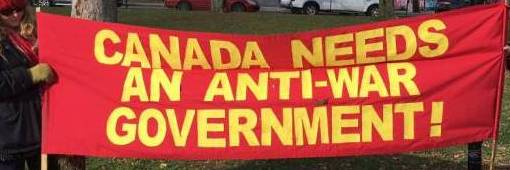
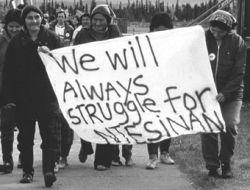 In the 1980s
Inuit assert sovereignty over their lands, Ntesinan, and oppose
NATO flights over it.
In the 1980s
Inuit assert sovereignty over their lands, Ntesinan, and oppose
NATO flights over it. 